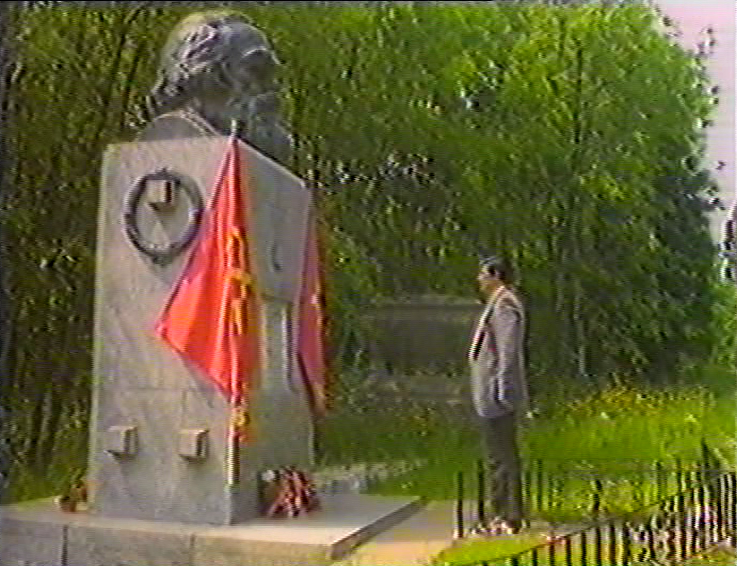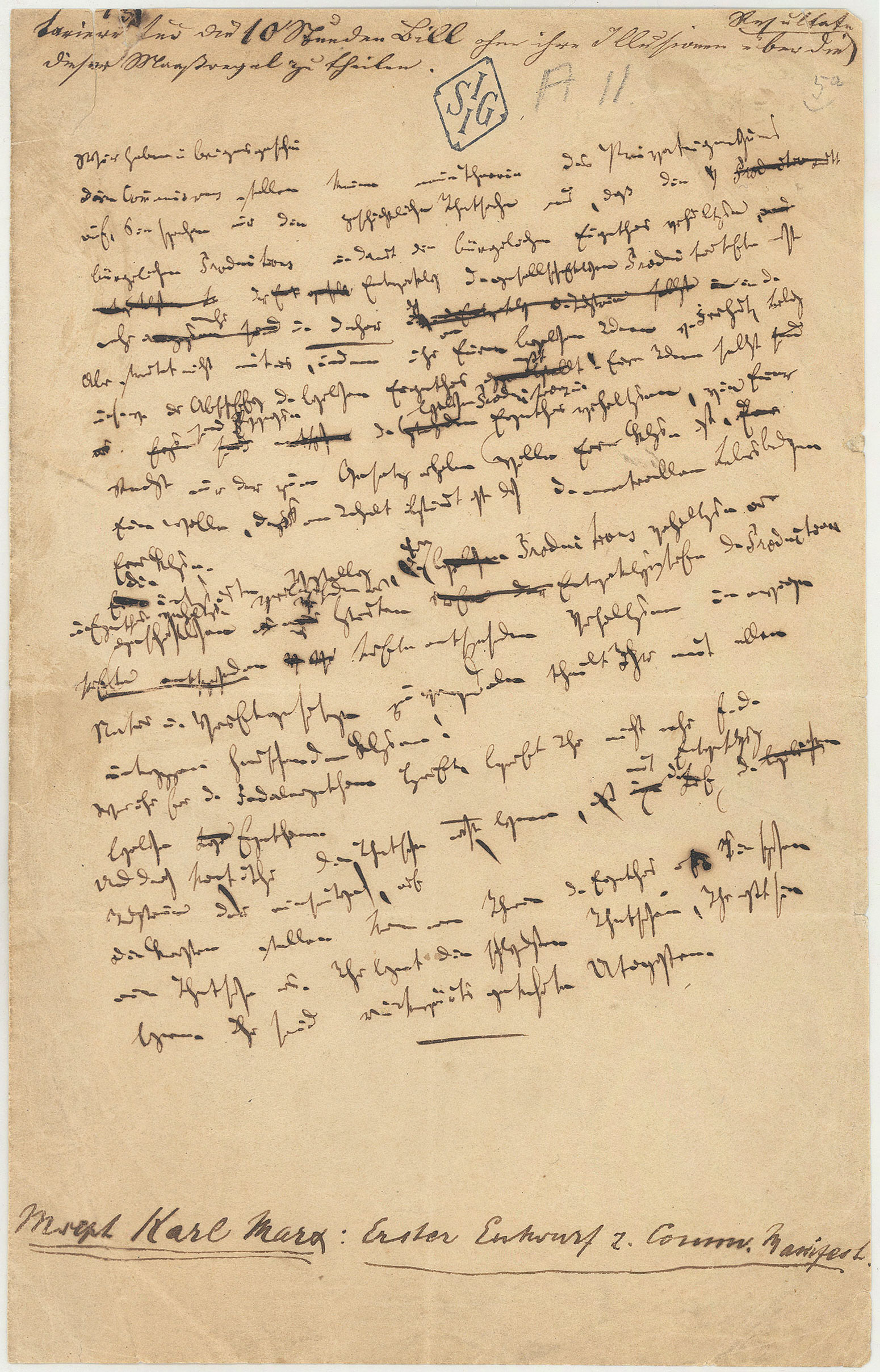
|
May 5, 2018 - No. 17 Urgent Need to Renew the Democratic Process Prime Minister's
Contempt for
• Trudeau
Government Tables Bill C-76 to Amend the Electoral Law Urgent Need to Renew the Democratic Process Prime Minister's Contempt for Democratic Principle
The political system in Canada is in serious crisis.
Time and time again, in all spheres of life, people have expressed deep
discontent with a system that permits decisions to be taken over which
they exercise no control. The system called a representative democracy
is mired in a deep credibility and legitimacy crisis because of this.
The absence of the appearance of governance with the consent of the
people is palpable. Reforms that do not address this fundamental
problem only lead to a worsening of the crisis. Recent electoral reform
legislation and remarks by Prime Minister Justin Trudeau serve to
underscore this situation. Adding to the credibility crisis plaguing the system of representative democracy is the fact that what are promoted as "election issues" by globe-trotting political marketing strategists are comprised of the demands of supranational interests. Along with image-makers for party leaders, these strategists work to win by hook or by crook. Party platforms and the persona of the leader are developed on the basis of poll questions, focus groups and other endeavours engineered to serve private interests. Random individuals and groups are asked to express preferences which are then aggregated to reach the dubious conclusion that they constitute what "the people want." This is then pronounced to be the majority opinion of the polity. It is ludicrous. All told, the electoral process as it currently exists in Canada serves to shut down public discussion and quash any political movement of the people for empowerment. The fundamental democratic principles that people have the right to elect and be elected and that electoral legitimacy requires an informed electorate are thrown out the window. What they stand for is not to be discussed. In fact, today, scandal-mongering has become a preferred method to deprive people of an outlook which favours them. Vicious fighting for power leads one faction of the ruling class to lead a charge which tarnishes the reputations of adversaries. The aim is to make them respond to the allegations in a manner which embroils the polity in the scandal-mongering. The pot calls the kettle black and the voter is left without an opportunity to cast an informed vote after participating in discussion about the best way forward for the society. Making the credibility crisis worse, on February 1, 2017, Prime Minister Justin Trudeau declared he would not implement his promised electoral reform to make the way votes are counted more representative. Despite how loudly he had touted his promise as a mandate from the people during the last election and despite the fact that making the system more representative is the last thing any of those who seek power and strive to retain it want to do, the Prime Minister managed to present his change of mind as a matter of high ideals. Prime Minister Trudeau rejected the system of representation recommended by the all-party Special Committee on Electoral Reform saying: "If we were to make a change or risk a change that would augment individual voices -- that would augment extremist voices and activist voices that don't get to sit within a party that figures out what's best for the whole future of the country, like the three existing parties do -- I think we would be entering a period of instability and uncertainty. And we'd be putting at risk the very thing that makes us luckier than anyone on the planet." When questioned, he added: "If you have a party that represents fringe voices, or the periphery of our perspectives and they hold 10, 15, 20 seats in the House, they end up holding the balance of power. The strength of our democracy is, we have to pull people together into big parties that have all the diversity of Canada, and who learn to get along. You don't learn to amplify small voices, you learn to listen to all voices. And that's why we have a system that works so well."
It is hard to comprehend how this unabashed declaration in defence of privilege and the status quo can be reconciled with democratic principles. What he says and does to the voices he deems to be fringe or extremist when they arise within his own "big tent" is left unspoken. Even a cursory review of the history of political parties in this country shows that they all became "big tents" in response to the movement for people's empowerment to make sure power remained in the hands of the few. The role of the parties which form a cartel system, why they are in crisis and the conception of national interest they uphold speak volumes on the need for political renewal. The Prime Minister's statement diverts attention from the profound crisis in which the system of representative democracy is mired because it works to bring parties acting on behalf of private supranational interests to power. Declarations that these parties represent the national interest and that anyone who opposes this self-serving definition of the national interest poses a threat to national security are advanced to serve this process. Those who are declared to be acting against this national interest must be the fringe voices, extremist voices, activist voices, which the Prime Minister so arrogantly seeks to outlaw.
The Marxist-Leninist Party of Canada (MLPC) has long held the position that the aim of the democratic electoral process should be to empower Canadians directly, not to form a party government. The process requires renewal so as to eliminate the exercise of privilege over it, especially by privileged leaders and political parties and their access to power. The Prime Minister is using his privileged position to utter impudent statements which make a mockery of a modern conception of freedom of speech as a right. His conception of fringe, extremist and activist voices causing instability also confounds what constitutes legitimate political discourse that contributes to political and social progress with threats to the national interest, national security and national unity. It is imperative that Canadians discuss the conception of national interest the ruling class is promoting. It is a conception which is increasingly embroiling Canada in the U.S. striving for world hegemony against rival powers. It is up to the Canadian people to define these matters, not those who benefit from the integration of Canada's economy with the U.S. war machine. The MLPC is confident that once Canadians become
familiar with the proposed changes to the electoral law, they will see
for themselves that these changes do not in fact make the law more
democratic nor modern in terms of reforms that are required to fulfill
the right of Canadians to elect and be elected and to an informed vote.
The more the people are excluded, the more they still strive for
empowerment and solve the problems they face to become the
decision-makers themselves.
Trudeau Government Tables Bill C-76
|
|
|
Hardial Bains, the founder and leader of our Party until his untimely death in 1997, pointed out:
"Karl Marx discovered the law of motion of the society and the specific law of motion of the capitalist mode of production. It is because of the operation of these laws that motion has also been created in the sphere of ideas, science and theory. At the time the society split up into the two irreconcilable classes -- the bourgeoisie and the proletariat -- the entire tradition of science and enlightenment went to that class, the proletariat, whose interest it is to end all conditions of exploitation of persons by persons. Because of the mission which befalls it, the proletariat is the only class which is not prejudiced. Science needs such a condition in order to advance.
"It is the discoveries of Karl Marx which provided the
class
with consciousness, showed it its aim based on the direction of
the class struggle, the direction in which the society is headed,
and how to get there. But Karl Marx was first and foremost a
revolutionist. The science which he gave rise to has both
proletarian partisanship and revolutionary character and thus it
is of no use to the bourgeoisie. To be a scientist, to be
revolutionist, it is necessary to be the continuer of the
glorious road on which stands the glorious name of Karl Marx, the
road of the victory of the highest ideals of humankind."[3]
CPC(M-L) takes up this work in its complexity and in
its
profundity in order to ensure that the working class is armed
with the spiritual weapon which it finds in Marxism-Leninism,
while Marxism-Leninism finds its material weapon in the working
class. The merging of the theory of Marxism-Leninism with the
working class movement is one of the most important factors in
the preparation of the human factor/social consciousness which is
a necessary material condition to open society's path to
progress.
This consciousness is taken by the Party to
all
sections of
the society. When the Party talks about the independent movement
of the working class, far from narrowing down the scope of the
working class movement, limiting it to what are called "working
class issues," the Party has in mind its program for the working
class to constitute the nation and vest sovereignty in the
people. It is the movement of the working class for its own
emancipation in the course of which it emancipates all of the
society. While the bourgeoisie presents the working class as
self-centred, with narrow aims, the Marxist-Leninist position is
not self-serving; it does not change according to convenience or
according to whether the Party is addressing itself to the
working class, or to the youth, to women or any other section of
society. The working class has no standing or possibility of
affecting the affairs of the society in a revolutionary way if it
is separate and divorced from the problems of the society and is
aloof from the problems of all the exploited and oppressed and
stands away from the high road of civilization. The working class
cannot march on the high road of civilization just because it is
the working class -- it must have its vanguard in the form of a
political party which is a trusted and tested general staff which
sees in the struggle to open society's path to progress the
greatest advance on the high road of civilization. Thus the
vanguard does not act by rejecting the high road but marches on
it, appropriating what is best and relying on the working class
as the material force which history has brought into being for
the realization of this task.
Today, the name and work of Karl Marx live on in the
hearts
and minds of millions who aspire to build the New, a society in which
all humans will flourish. Those
who wish to organize the working class to take up its leading
role in building that society must use Marxism as a guide
to action.
Hardial Bains speaking at the Seminar on the Occasion of the 110th
Anniversary of the Death of Karl Marx" held at the Marx Memorial
Library in London on September 5, 1993.
Hardial Bains at Lenin's desk at the Marx Memorial Library in London,
September 1993.
Notes
1. V.I. Lenin, "The Historical
Destiny of the Doctrine of Karl Marx," Selected Works, Vol. 1
(Moscow: Marx-Engels-Lenin Institute, 1908), p. 64.
2. Karl Marx, "Letter to J. Weydemeyer, London, March 5, 1852" in Marx and Engels, Selected Works, Vol. 1 (Moscow: Progress Publishers, 1973), p. 528.
3. Hardial Bains, "The Necessity
for the Mass Party Press," Speech at the Scientific Session on the
Fifteen Years of the Party Press, September 1, 1985, A Week of
Celebrations, MELS, Toronto, 1985.
Biography of Marx
The following biography of Karl Marx was written by Frederick Engels in June, 1877, six years before Marx passed away on March 14, 1883. First published in the Volkskalender, an almanac which appeared in Brunswick in 1878, it was translated from the original German by the Foreign Languages Publishing House of the Soviet Union in 1955 and published in a pamphlet titled On Marx.
***
Karl Marx, the man who was the first to give socialism, and thereby the whole labour movement of our day, a scientific foundation, was born at Trier in 1818. He studied in Bonn and Berlin, at first taking up law, but he soon devoted himself exclusively to the study of history and philosophy, and in 1842 was on the point of establishing himself as an assistant professor in philosophy when the political movement which had arisen since the death of Frederick William III directed his life into a different channel. With his collaboration, the leaders of the Rhenish liberal bourgeoisie, the Camphausens, Hansemanns, etc., had founded, in Cologne, the Rheinische Zeitung[1] and in the autumn of 1842, Marx, whose criticism of the proceedings of the Rhenish Landtag diet had excited very great attention, was put at the head of the paper. The Rheinische Zeitung naturally appeared under censorship, but the censorship could not cope with it.[2] The Rheinische Zeitung almost always got through the articles which mattered; the censor was first supplied with insignificant fodder for him to strike out, until he either gave way of himself or was compelled to give way by the threat that then the paper would not appear the next day. Ten newspapers with the same courage as the Rheinische Zeitung and whose publishers would have allowed a few hundred thalers extra to be expended on typesetting -- and the censorship would have been made impossible in Germany as early as 1843. But the German newspaper owners were petty-minded, timid philistines and the Rheinische Zeitung carried on the struggle alone. It wore out one censor, after another; finally it came under a double censorship; after the first censorship the Regierungspräsident[3] had once more and finally to censor it. That also was of no avail. In the beginning of 1843, the government declared that it was impossible to keep this newspaper in check and suppressed it without more ado.
Marx, who in the meanwhile
had married the sister of von
Westphalen, later minister of the reaction, removed to Paris, and
there, in conjunction with A. Ruge, published the German-French
Annuals, in which he opened the series of
his socialist writings with a Criticism of the Hegelian
Philosophy of Law. Further, together with F. Engels, The
Holy Family: Against Bruno Bauer and Co., a satirical
criticism of one of the latest forms blunderingly assumed by the
German philosophical idealism of that time.
The study of political economy and of the history of the
Great French Revolution still allowed Marx time enough for
occasional attacks on the Prussian government; the latter
revenged itself in the spring of 1845 by securing from the Guizot
ministry -- Herr Alexander von Humboldt is said to have acted as
intermediary -- his expulsion from France. Marx shifted his
domicile to Brussels and published there in French in 1847: The
Poverty of Philosophy, a criticism of Proudhon's Philosophy of
Poverty, and in 1848 Discourse on
Free
Trade. At the same time he made use of the opportunity to
found a German workers' society in Brussels and so commenced
practical agitation. The latter became still more important for
him when he and his political friends in 1847 entered the secret Communist
League, which had already been in
existence for
a number of years. Its whole structure was now radically changed;
this association, which previously was more or less
conspiratorial, was transformed into a simple organization of
Communist propaganda, which was only secret because necessity
compelled it to be so, the first organization of the
German social-democratic party. The League existed wherever
German workers' unions were to be found; in almost all of these
unions in England, Belgium, France and Switzerland, and in very
many of the unions in Germany the leading members belonged to the
League and the share of the League in the incipient German labour
movement was very considerable. Moreover, our League was the
first which emphasized the international character of the whole
labour movement and realized it in practice, which had
Englishmen, Belgians, Hungarians, Poles, etc., as members and
which organized international labour meetings, especially in
London.
|
|
The transformation of the League took place at two
congresses
held in 1847, the second of which resolved on the elaboration and
publication of the fundamental principles of the Party in a
manifesto to be drawn up by Marx and Engels. Thus arose the Manifesto
of
the
Communist
Party, which first
appeared in
1848, shortly before the February Revolution, and has since been
translated into almost all the European languages.
The Deutsche Brüsseler Zeitung,[4] in which Marx participated and which mercilessly exposed the blessings of the police regime of the fatherland, caused the Prussian government to try to effect Marx's expulsion once more, but in vain. When, however, the February Revolution resulted in popular movements also in Brussels, and a radical change appeared to be imminent in Belgium, the Belgian government arrested Marx without ceremony and deported him. In the meanwhile, the French Provisional Government had sent him through Flocon an invitation to return to Paris, and he accepted this call.
In Paris he came out especially against the swindle, widespread among the Germans there, of wanting to form the German workers in France into armed legions in order to carry the revolution and the republic into Germany. On the one hand, Germany had to make her revolution herself, and, on the other hand, every revolutionary foreign legion formed in France was betrayed in advance by the Lamartines of the Provisional Government to the government which was to be overthrown, as occurred in Belgium and Baden.
After the March Revolution, Marx went to Cologne and founded there the Neue Rheinische Zeitung,[5] which was in existence from June 1, 1848 to May 19, 1849 -- the only paper which represented the standpoint of the proletariat within the democratic movement of the time, as shown in its unreserved championship of the Paris June insurgents of 1848, which cost the paper the defection of almost all its shareholders.
In vain the Kreuzzeitung,[6] pointed to the "Chimborazo[7] impudence" with which the Neue
Rheinische
Zeitung attacked everything sacred, from the king
and vice-regent of the realm down to the gendarme, and that, too,
in a Prussian fortress with a garrison of 8,000 at that time. In
vain was the rage of the Rhenish liberal philistines, who had
suddenly become reactionary. In vain was the paper suspended by
martial law in Cologne for a lengthy period in the autumn of
1848. In vain the Reich Ministry of Justice in Frankfurt
denounced article after article to the Cologne Public Prosecutor
in order that judicial proceedings should be taken. Under the
very eyes of the police the paper calmly went on being edited and
printed, and its distribution and reputation increased with the
vehemence of its attacks on the government and the bourgeoisie.
When the Prussian coup d'état took place in November
1848,
the Neue Rheinische Zeitung called at the head of each
issue upon the people to refuse to pay taxes and to meet violence
with violence. In the spring of 1849, both on this account and
because of another article, it was made to face a jury, but on
both occasions was acquitted. Finally, when the May risings of
1849 in Dresden and the Rhine province had been suppressed, and
the Prussian campaign against the Baden-Palatinate rising had
been inaugurated by the concentration and mobilization of
considerable masses of troops, the government believed itself
strong enough to suppress the Neue Rheinische Zeitung by
force. The last number -- printed in red ink -- appeared on May
19.
Marx again went to Paris, but only a few weeks after the
demonstration of June 13, 1849 he was faced by the French
government with the choice of either shifting his residence to
Brittany or leaving France. He preferred the latter and moved to
London, where he has lived uninterruptedly ever since. An attempt
to continue to issue the Neue Rheinische Zeitung in the
form of a review (in Hamburg, 1850) had to be given up after a
while in view of the ever-increasing violence of the reaction.
Immediately after the coup d'etat in France in December
1851, Marx published: The Eighteenth Brumaire of Louis
Bonaparte (Boston 1852; second edition, Hamburg 1869,
shortly before the war). In 1853 he wrote: Revelations About
the Cologne Communist Trial (first printed in Basle, later in
Boston, and again recently in Leipzig).
After the condemnation of the members of the Communist League in Cologne, Marx withdrew from political agitation and for ten years devoted himself, on the one hand, to the study of the rich treasures offered by the library of the British Museum in the sphere of political economy, and, on the other hand, to writing for the New York Tribune,[8] which up to the outbreak of the American Civil War published not only contributions signed by him but also numerous leading articles on conditions in Europe and Asia from his pen. His attacks on Lord Palmerston, based on an exhaustive study of British official documents, were reprinted in London in pamphlet form.
As the first fruit of his many years of study of economics, there appeared in 1859 A Contribution to the Critique of Political Economy, Part I (Berlin, Duncker). This work contains the finest coherent exposition of the Marxian theory of Value, including the doctrine of money. During the Italian War Marx, in the German newspaper Das Volk,[9] appearing in London, attacked Bonapartism, which at that time posed as liberal and playing the part of liberator of the oppressed nationalities, and also the Prussian policy of the day, which under the cover of neutrality was seeking to fish in troubled waters. In this connection it was necessary to attack also Herr Karl Vogt, who at that time, on the commission of Prince Napoleon (Plon-Plon) and in the pay of Louis Napoleon, was carrying on agitation for the neutrality, and indeed the sympathy, of Germany. When Vogt heaped upon him the most abominable and deliberately false calumnies, Marx answered with: Herr Vogt (London, 1860), in which Vogt and the other gentlemen of the imperialist sham-democratic gang were exposed, and Vogt himself on the basis of both external and internal evidence was convicted of receiving bribes from the December empire. The confirmation came just ten years later: in the list of the Bonaparte hirelings, found in the Tuileries in 1870 and published by the September government, there was the following entry under the letter V: Vogt-in August 1859 there were remitted to him-Frs. 40,000."
Finally, in 1867 there appeared in Hamburg: Capital, a Critical Analysis of Capitalist Production, Volume I, Marx's chief work, which expounds the foundations of his economic-socialist conceptions and the main features of his criticism of existing society, the capitalist mode of production and its consequences. The second edition of this epoch-making work appeared in 1872; the author is engaged in the elaboration of the second volume.
Meanwhile the labour movement in various countries of
Europe
had so far regained strength that Marx could entertain the idea
of realizing a long-cherished wish: the foundation of a Workers'
Association embracing the most advanced countries of Europe and
America, which would demonstrate bodily, so to speak, the
international character of the socialist movement both to the
workers themselves and to the bourgeois and the governments --
for the encouragement and strengthening of the proletariat, for
striking fear into the hearts of its enemies. A mass meeting in
favour of Poland, which had just then again been crushed by
Russia, held on September 28, 1864, in St. Martin's Hall in
London, provided the occasion for bringing forward the matter,
which was enthusiastically taken up. The International Working
Men's Association was founded; a Provisional General Council,
with its seat in London, was elected at the meeting, and Marx was
the soul of this as of all subsequent General Councils up to the
Hague Congress. He drafted almost everyone of the documents
issued by the General Council of the International, from the Inaugural
Address, 1864, to the Address on the
Civil
War in France, 1871. To describe Marx's activity in the
International is to write the history of this Association, which
in any case still lives in the memory of the European
workers.
The fall of the Paris Commune put the International in an impossible position. It was thrust into the forefront of European history at a moment when it had everywhere been deprived of all possibility of successful practical action. The events which raised it to the position of the seventh Great Power simultaneously forbade it to mobilize its fighting forces and employ them in action, on pain of inevitable defeat and the setting back of the labour movement for decades. In addition, from various sides elements were pushing themselves forward that sought to exploit the suddenly enhanced fame of the Association for the purpose of gratifying personal vanity or personal ambition, without understanding the real position of the International or without regard for it. A heroic decision had to be taken, and it was again Marx who took it and who carried it through at the Hague Congress.
In a solemn resolution, the International disclaimed all responsibility for the doings of the Bakuninists, who formed the centre of those unreasonable and unsavoury elements. Then, in view of the impossibility of also meeting, in the face of the general reaction, the increased demands which were being imposed upon it, and of maintaining its complete efficacy other than by a series of sacrifices which would have drained the labour movement of its life-blood -- in view of this situation, the International withdrew from the stage for the time being by transferring the General Council to America. The results have proved how correct was this decision -- which was at the time, and has been since, so often censured. On the one hand, it put a stop then and since to all attempts to make useless putsches in the name of the International, while, on the other hand, the continuing close intercourse between the socialist workers' parties of the various countries proved that the consciousness of the identity of interests and of the solidarity of the proletariat of all countries evoked by the Intemational is able to assert itself even without the bond of a formal international association, which for the moment had become a fetter.
After the Hague Congress, Marx at last found peace and leisure again for resuming his theoretical work, and it is to be hoped he will be able before long to have the second volume of Capital ready for the press.
Of the many important discoveries through which Marx has inscribed his name in the annals of science, we can here dwell on only two.
The first is the revolution brought about by him in the whole conception of world history. The whole previous view of history was based on the conception that the ultimate causes of all historical changes are to be looked for in -- the changing ideas of human beings, and that of all historical changes political changes are the most important and dominate the whole of history. But the question was not asked as to whence the ideas come into men's minds and what the driving causes of the political changes are. Only upon the newer school of French, and partly also of English, historians had the conviction forced itself that, since the Middle Ages at least, the driving force in European history was the struggle of the developing bourgeoisie with the feudal aristocracy for social and political domination. Now Marx has proved that the whole of previous history is a history of class struggles, that in all the manifold and complicated political struggles the only thing at issue has been the social and political rule of social classes, the maintenance of domination by older classes and the conquest of domination by newly arising classes. To what, however, do these classes owe their origin and their continued existence? They owe it to the particular material, physically sensible conditions in which society, at a given period produces and exchanges its means of subsistence. The feudal rule of the Middle Ages rested on the self-sufficient economy of small peasant communities, which themselves produced almost all their requirements, in which there was almost no exchange and which received from the arms-bearing nobility protection from without and national or at least political cohesion. When the towns arose and with them separate handicraft industry and trade intercourse, at first internal and later international, the urban bourgeoisie developed, and already during the Middle Ages achieved, in struggle with the nobility, its inclusion in the feudal order as likewise a privileged estate. But with the discovery of the extra-European world, from the middle of the fifteenth century onwards, this bourgeoisie acquired a far more extensive sphere of trade and therewith a new spur for its industry; in the most important branches handicrafts were supplanted by manufacture, now on a factory scale, and this again was supplanted by large-scale industry, become possible owing to the discoveries of the previous century, especially that of the steam engine. Large-scale industry, in its turn, reacted on trade by driving out the old manual labour in backward countries, and creating, the present-day new means of communication: steam engines, railways, electric telegraphy, in the more developed ones. Thus the bourgeoisie came more and more to combine social wealth and social power in its hands while it still for a long period remained excluded from political power, which was in the hands of the nobility and the monarchy supported by the nobility. But at a certain stage -- in France since the Great Revolution -- it also conquered political power, and now in turn became the ruling class over the proletariat and small peasants. From this point of view all the historical phenomena are explicable in the simplest possible way -- with sufficient knowledge of the particular economic condition of society, which it is true is totally lacking in our professional historians, and in the same way the conceptions and ideas of each historical period are most simply to be explained from the economic conditions of life and from the social and political relations of the period, which are in turn determined by these economic conditions. History was for the first time placed on its real basis; the palpable but previously totally overlooked fact that men must first of all eat, drink, have shelter and clothing, therefore must work, before they can fight for domination, pursue politics, religion, philosophy, etc. This palpable fact at last came into its historical rights.
This new conception of history, however was of supreme significance for the socialist outlook. It showed that all previous history moved in class antagonisms and class struggles, that there have always existed ruling and ruled, exploiting and exploited classes, and that the great majority of mankind has always been condemned to arduous labour and little enjoyment. Why is this? Simply because in all earlier stages of development of mankind production was so little developed that the historical development could proceed only in this antagonistic form that historical progress as a whole was assigned to the activity of a small privileged minority, while the great mass remained condemned to producing by their labour their own meagre means of subsistence and also the increasingly rich means of the privileged. But the same investigation of history, which in this way provides a natural and reasonable explanation of the previous class rule otherwise only explicable from the wickedness of man, also leads to the realization that, in consequence of the so tremendously increased productive forces of the present time, even the last pretext has vanished for a division of mankind into rulers and ruled, exploiters and exploited, at least in the most advanced countries that the ruling big bourgeoisie has fulfilled its historic mission, that it is no longer capable of the leadership of society and has even become a hindrance to the development of production, as the trade crises, and especially the last great collapse, and the depressed condition of industry in all countries have proved; that historical leadership has passed to the proletariat, a class which, owing to its whole position in society, can only free itself by abolishing altogether all class rule, all servitude and, all exploitation, and that the social productive forces, which have outgrown the control of the bourgeoisie, are only waiting for the associated proletariat to take possession of them in order to bring about a state of things in which every member of society will be enabled to participate not only in production but also in the distribution and administration of social wealth, and which so increases the social productive forces and their yield by planned operation of the whole of production that the satisfaction of all reasonable needs will be assured to everyone in an ever-increasing measure.
The second important discovery of Marx is the final elucidation of the relation between capital and labour, in other words, the demonstration how, within present society and under the existing capitalist mode of production, the exploitation of the worker by the capitalist takes place. Ever since political economy had put forward the proposition that labour is the source of all wealth and of all value, the question became inevitable: How is this then to be reconciled with the fact that the wage-worker does not receive the whole sum of value created by his labour but has to surrrender a part of it to the capitalist? Both the bourgeois economists and the Socialists exerted themselves to give, a scientifically valid answer to this question, but in vain, until, at last Marx came forward with the solution. This solution is as follows: The present-day capitalist mode of production presupposes the existence of two social classes -- on the one hand, that of the capitalists who are in possession of the means of production and subsistence, and, on the other hand that of the proletarians, who, being excluded from this possession, have only a single commodity for sale, their labour power, and who therefore have to sell this labour power of theirs in order to obtain possession of means of subsistence. The value of a commodity is, however, determined by the socially necessary quantity of labour embodied in its production, and, therefore also in its reproduction; the value of the labour power of an average human being during a day, month or year is determined, therefore, by the quantity of labour embodied in the quantity of means of subsistence necessary for the maintenance of this labour power during a day, month or year. Let us assume that the means of subsistence of a worker for one day requires, six hours of labour for their production, or, what is the same thing, that the labour contained in them represents a quantity of labour of six hours; then the value of labour power for one day will be, expressed in a sum of money which also embodies six hours of labour. Let us assume further that the capitalist who employs our worker pays him this sum in return, pays him, therefore, the full value of his labour power. If now the worker works six hours of the day for the capitalist, he has completely replaced the latter's outlay -- six hours' labour for six hours' labour. But then there would be nothing in it for the capitalist, and the latter therefore looks at the matter quite differently. He says: I have bought the labour power of this worker not for six hours but for a whole day, and accordingly he makes the worker work 8, 10, 12, 14 or more hours, according to circumstances, so that the product of the seventh, eighth and following hours is a product of unpaid labour and wanders, to begin with, into the pocket of the capitalist. Thus the worker in the service of the capitalist not only reproduces the value of his labour power, for which he receives pay, but over and above that he also produces, a surplus value which, appropriated in the first place by the capitalist, is in its further course divided according to definite economic laws among the whole capitalist class and forms the basic stock from which arise ground rent, profit, accumulation of capital, in short, all the wealth consumed or accumulated by the non-labouring classes. But this proved that the acquisition of riches by the present-day capitalists consists just as much in the appropriation of the unpaid labour of others as that of the slave-owner or the feudal lord exploiting serf labour, and that all these forms of exploitation are only to be distinguished by the difference in manner and method by which the unpaid labour is appropriated. This, however, also removed the last justification for all the hypocritical phrases of the possessing classes to the effect that in the present social order right and justice, equality of rights and duties and a general harmony of interests prevail, and present-day bourgeois society, no less than its predecessors, was exposed as a grandiose institution for the exploitation of the huge majority of the people by a small, ever-diminishing minority.
Modern, scientific socialism is based on these two
important
facts. In the second volume of Capital these and other
hardly less important scientific discoveries concerning the
capitalist system of society will be further developed, and
thereby those aspects also of political economy not touched upon
in the first volume will undergo revolutionization. May it be
vouchsafed to Marx to be able soon to have it ready for the
press.
Notes
1. Rhenish Gazette -- Ed.
2. The first censor of the Rheinische Zeitung was Police Councillor Dolleschall, the same man who once struck out an advertisement in the Kölnische Zeitung (Cologne Gazette) of the translation of Dante's Divine Comedy by Philalethes (later King John of Saxony) with the remark: One must not make a comedy of divine affairs. (Note by Engels.)
3. Regierungspräsident: In Prussia, regional representative of the central executive.-- Ed.
4. German Brussels Gazette: Organ of the German political emigrants in Brussels; published from 1847 to February 1848. In September 1847 Marx and Engels assumed the leadership of the newspaper. -- Ed.
5. New Rhenish Gazette. -- Ed.
6. Kreuzzeitung (Gazette of the Cross): This was the name generally applied to the reactionary monarchist daily, the Neue Preussische Zeitung (New Prussian Gazette), which began to appear in Berlin in 1848. Its head bore a cross. -- Ed.
7. Chimborazo: one of the highest peaks of the Andes Mountains in South America . -- Ed.
8. New York Daily Tribune: A daily democratic newspaper to which Marx contributed in 1851-62. It appeared in New York in 1841-1924. -- Ed.
9. Das Volk (The People): This German newspaper appeared in London from May to August 1859. Marx was one of its close collaborators. -- Ed.Exhibit of Works of Art and Other Items
of Interest
Portraits, Paintings, Drawings and Photographs
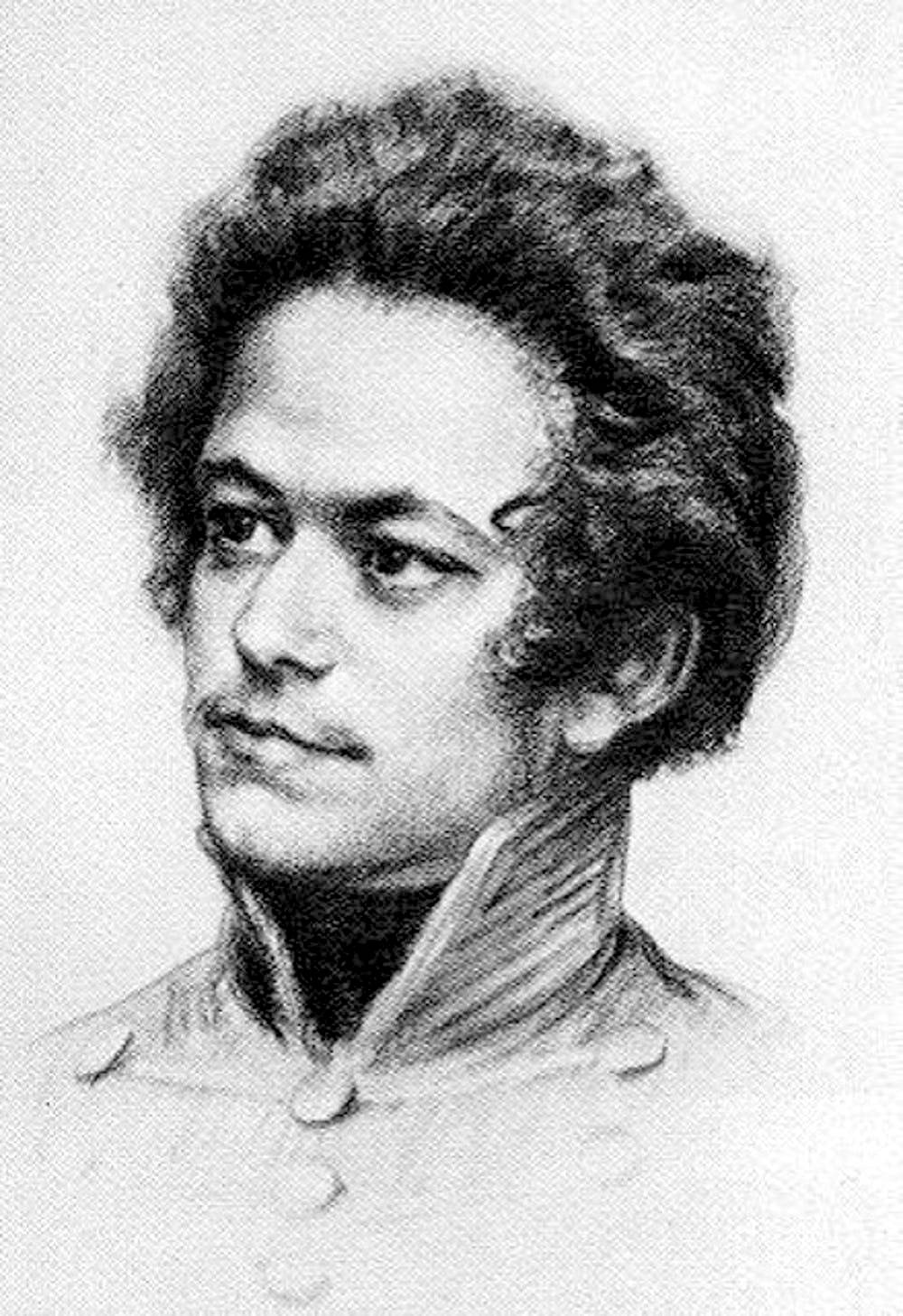
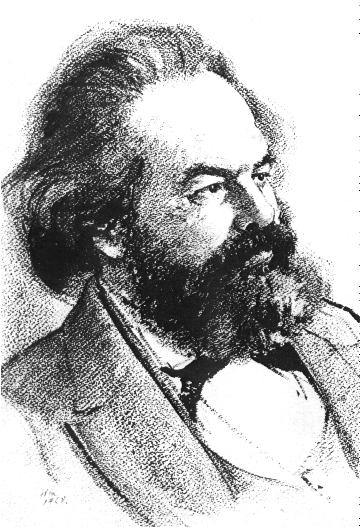
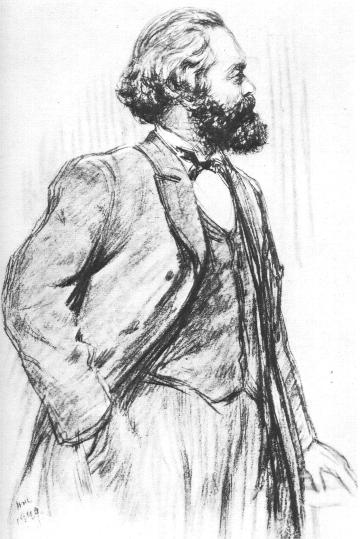
Left: Marx in 1839 (I. Grinstein);
centre
and
right:
Marx
(N. Zhukov).
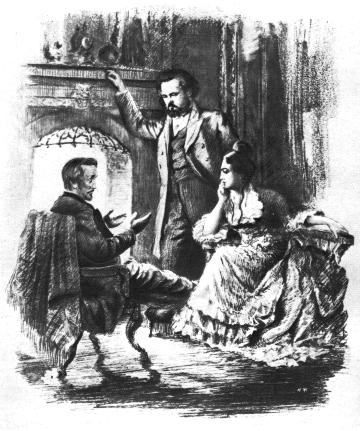
German writer Heinrich Heine visits Karl and Jenny Marx in Paris, 1844 (N. Zhukov).

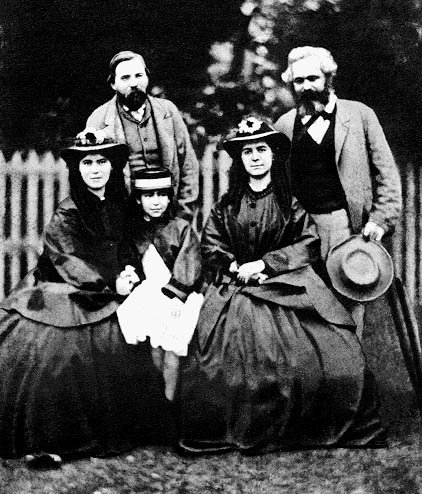
Left: earliest surviving photo of Karl Marx, taken in London in 1861.
Right: photograph taken May 19, 1864, during a four-day trip Frederick
Engels made to London. Shown with Marx and Engels are Marx's daughters,
left to right,
Jenny, Eleanor and Laura.
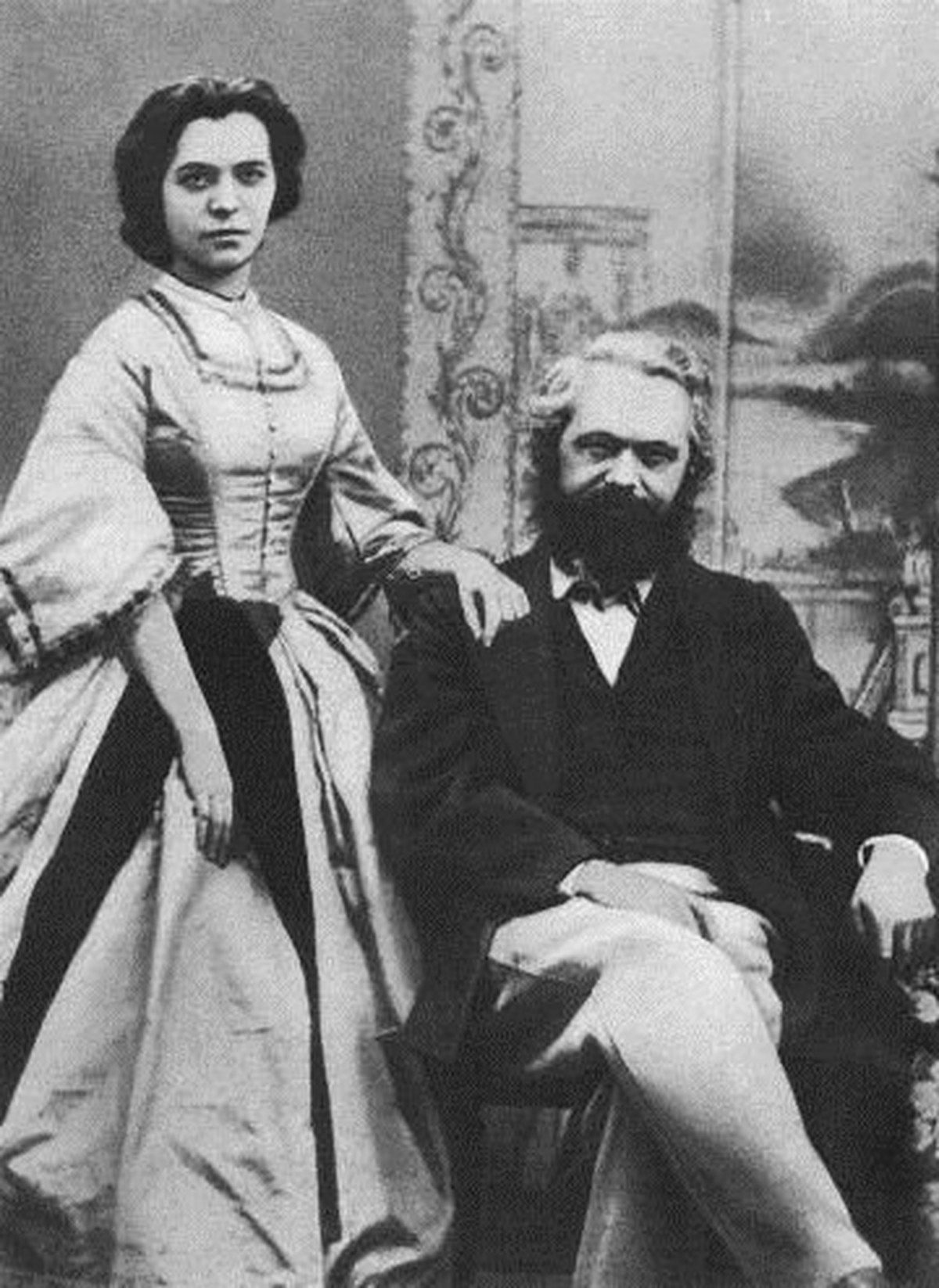
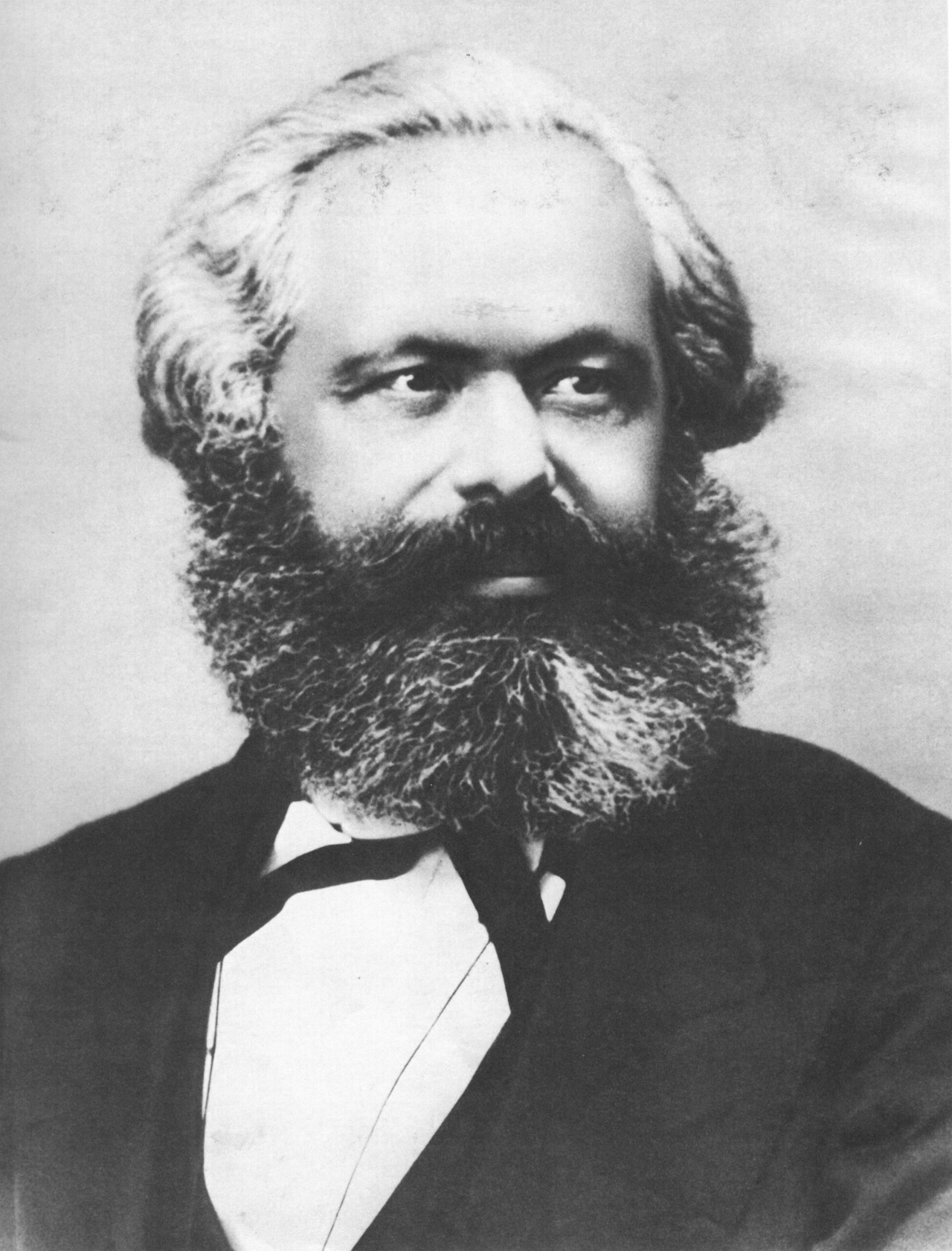
Left: Marx and his wife Jenny von Westphalen, at the seaside resort
Margate, England at the end of March 1866. Right: Marx, photographed in
Hannover in 1867, shortly after delivering the manuscript of Das
Kapital in Hamburg (F. Wunder).
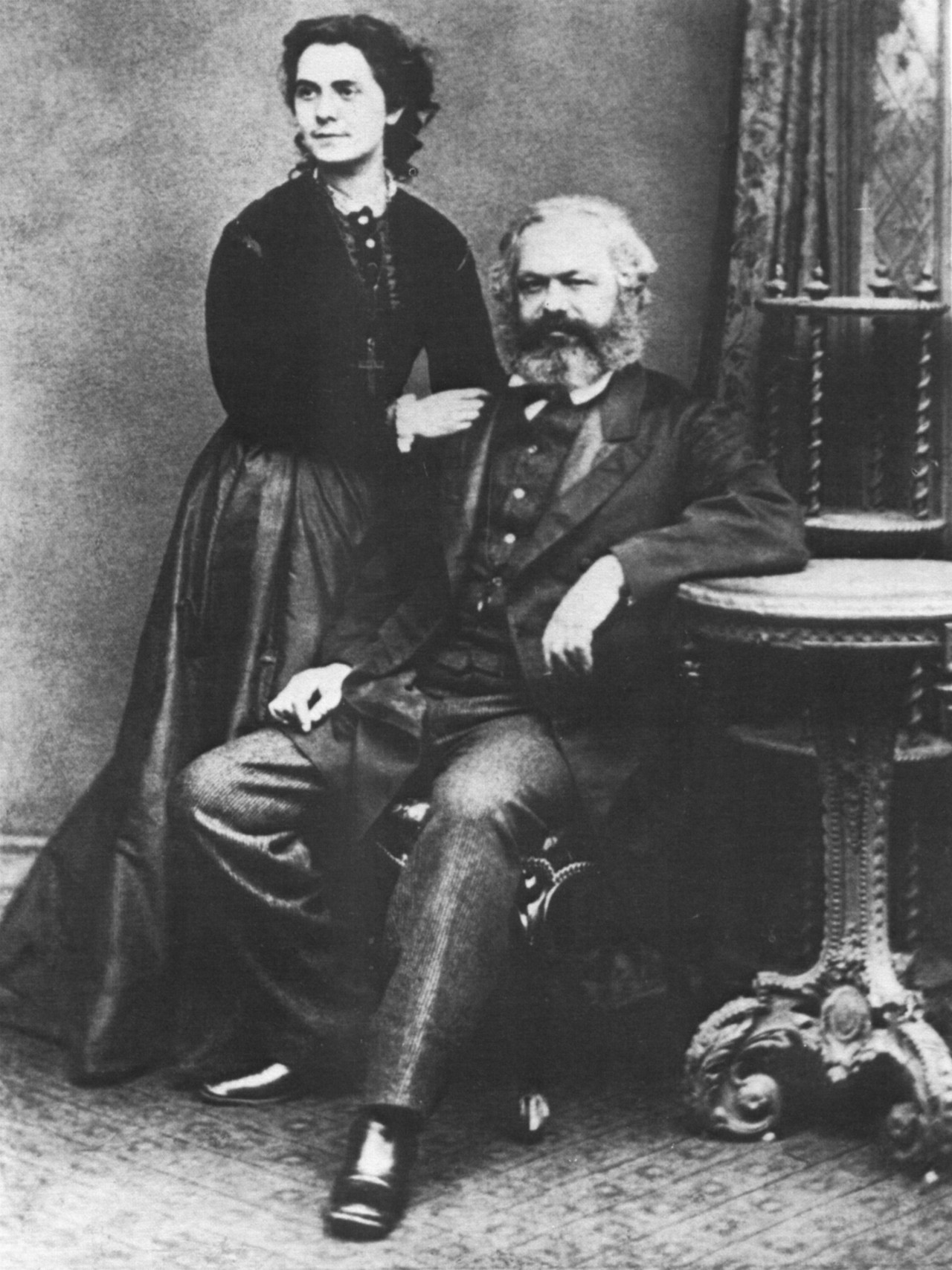
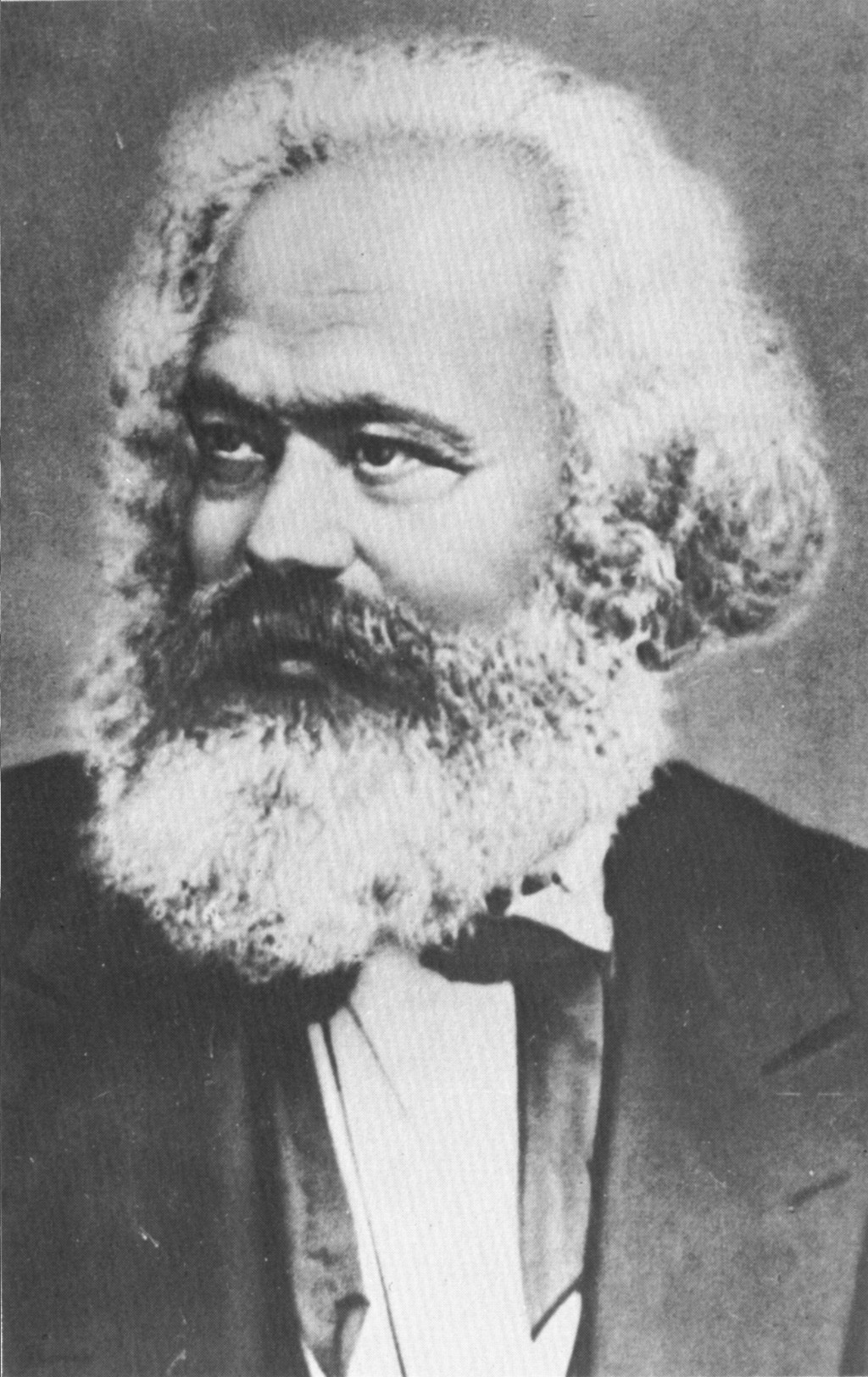
Left: Marx with his daughter Jenny in London, 1869. Jenny wears the
Polish
1864 Insurrection Cross, as a sign of mourning for the Fenians executed
in November 1867, who
had fought against
British rule in Ireland. Right: Photo given by Marx to his friend Louis
Kugelmann, summer of 1872.
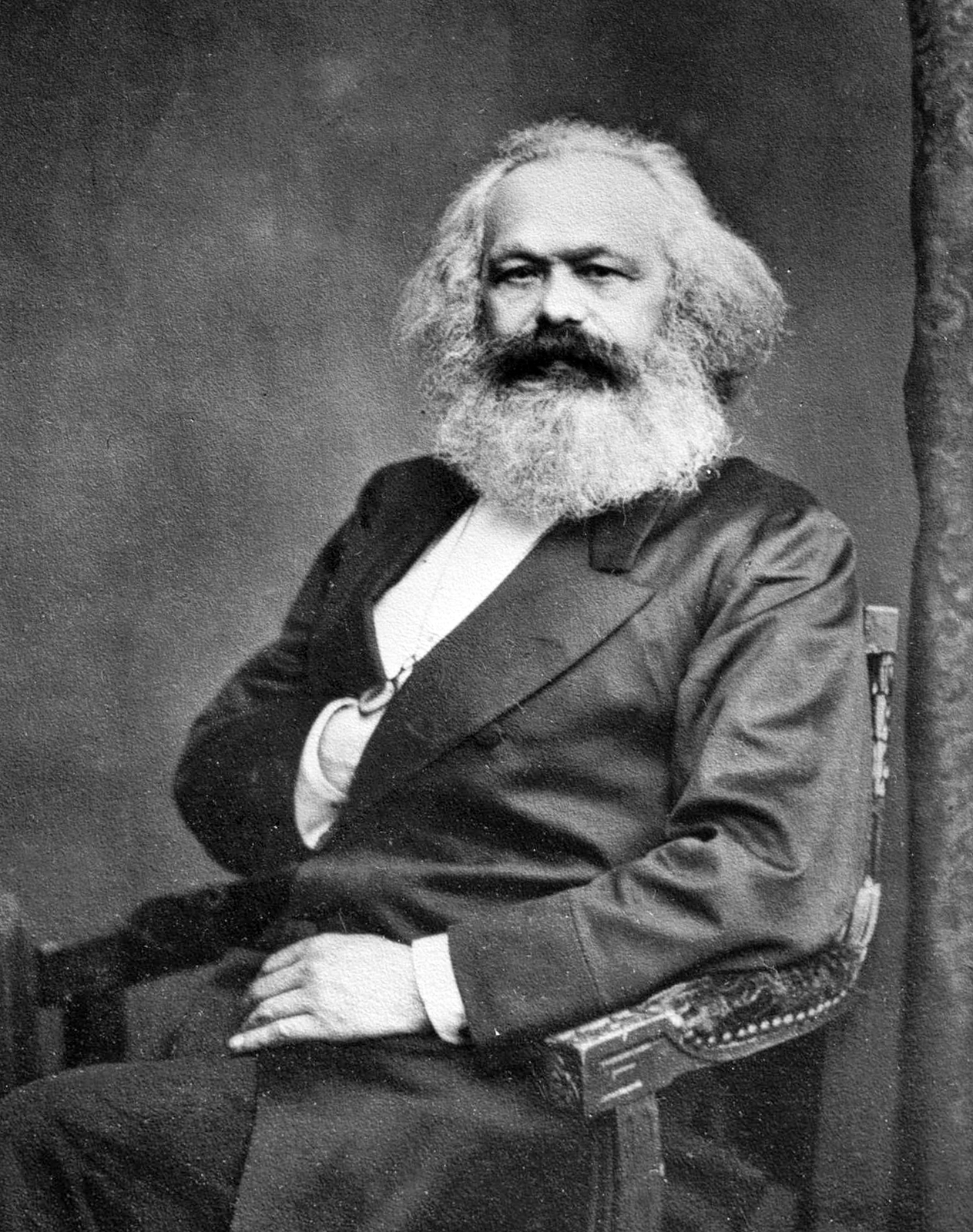

Marx in London in 1875 (J. Mayall).
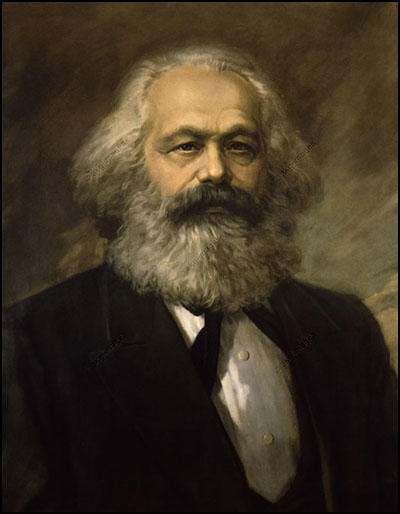
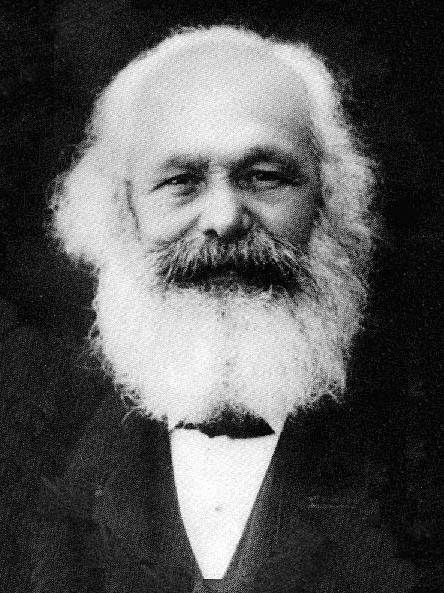
Left: Marx, circa 1870s (N. Gereljuk
and P.
Nararow); right: one of the last photos of Marx, taken in
Algiers in 1882. Marx had fallen seriously ill and had travelled to
Algeria on the advice of his doctor, where he stayed from February 20
to May 2, 1882.
Depictions of Life and Work
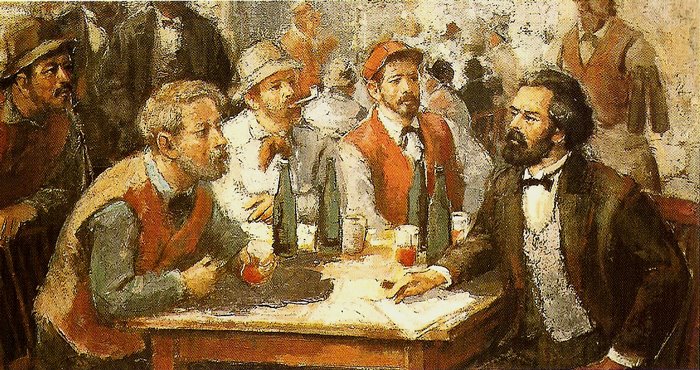
Marx speaks with workers (source
unknown).
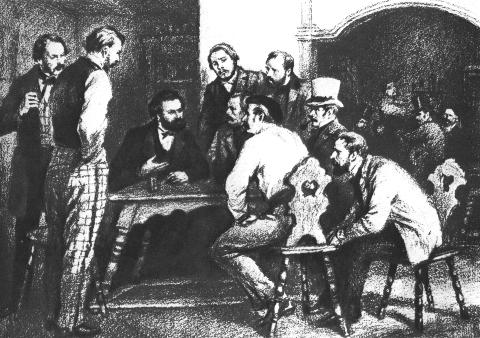
Marx and Engels among the workers (A.
Venetsian).
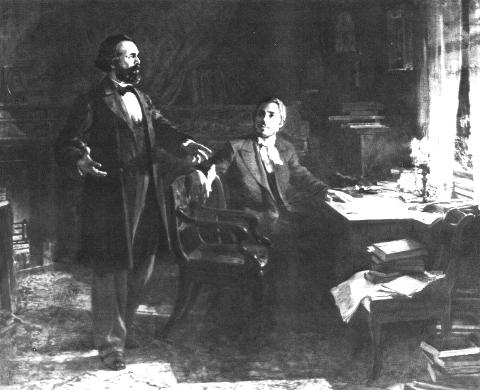
Marx and Engels working on the Manifesto,
circa
1448
(V. Polyakov).
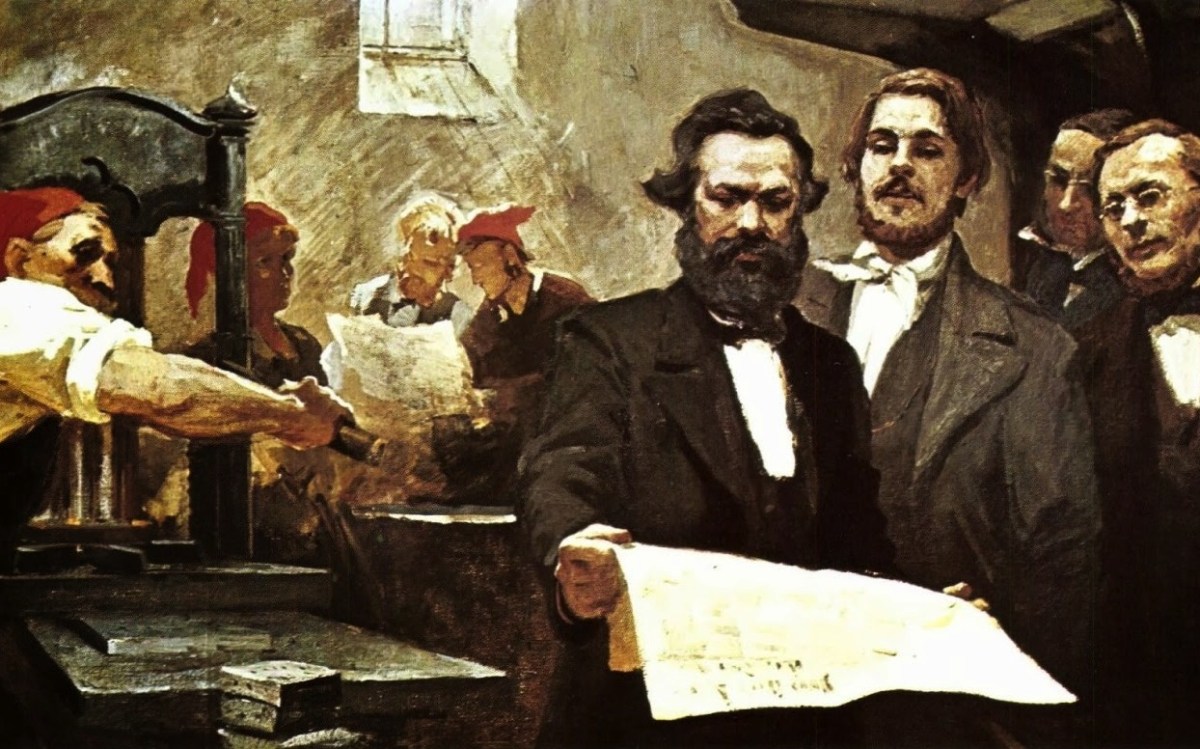
Marx at the printing house of the Neue
Rheinische
Zeitung
(artist unknown).
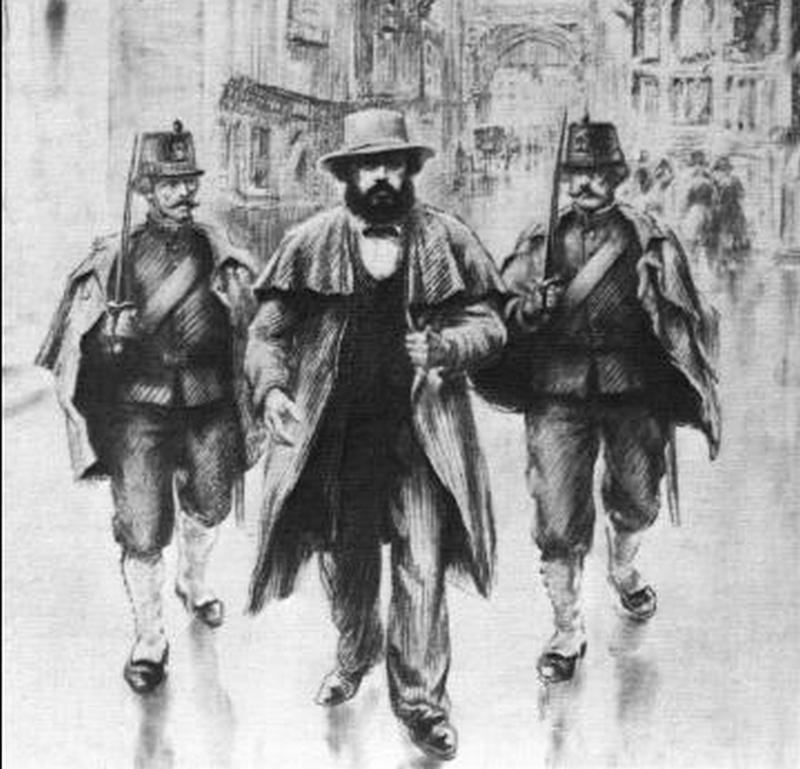
Marx arrested in Brussels (N. Zhukov).
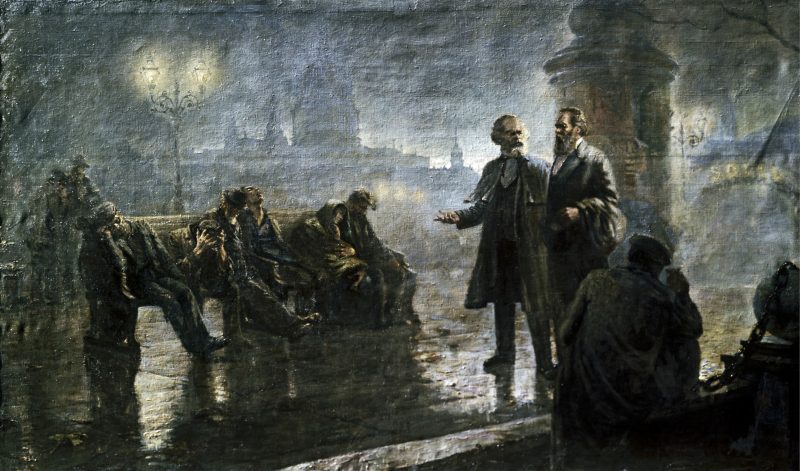
"Before the Sunrise" -- Karl Marx and Frederick Engels walking in
London
at night
(M. Dzhanashvili).

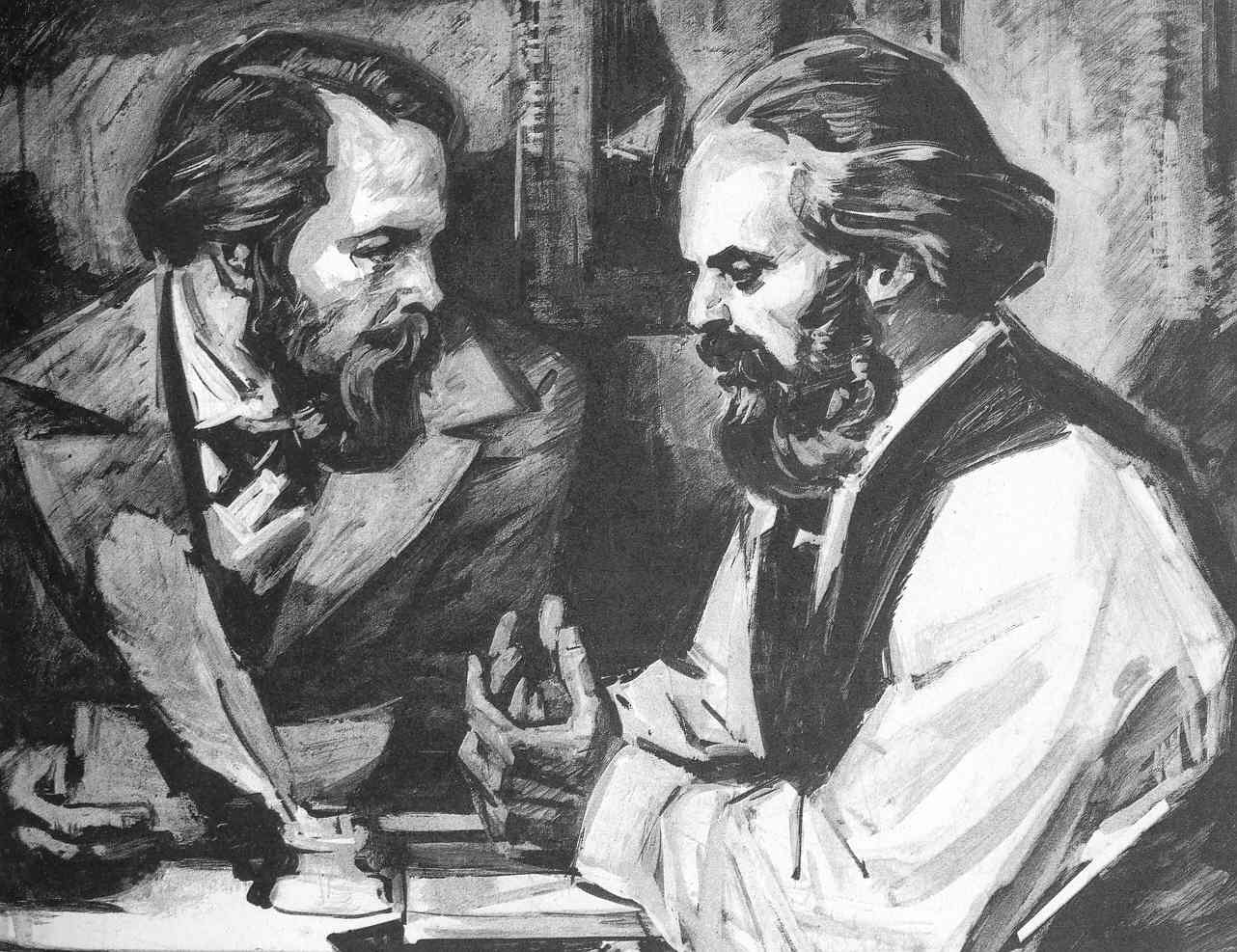
Marx and Engels (artist unknown).
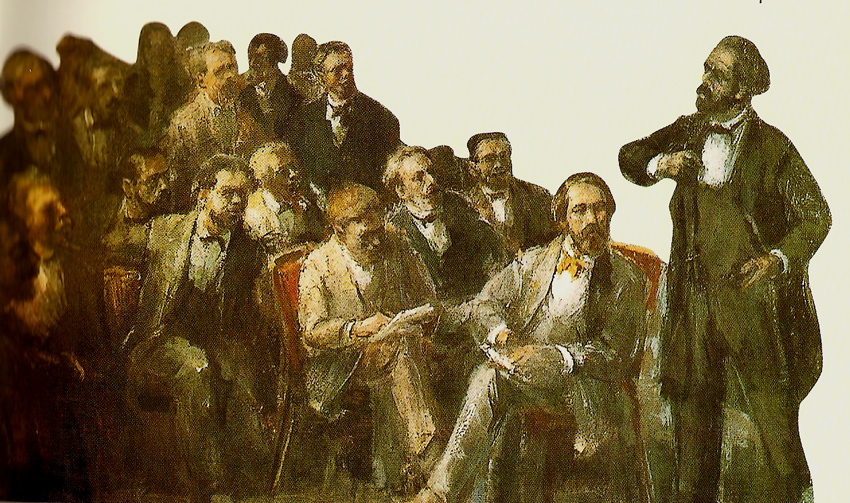
Marx speaks to Communist League (source
unknown).
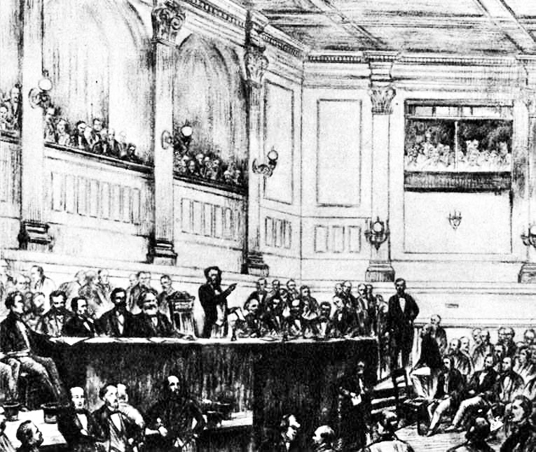
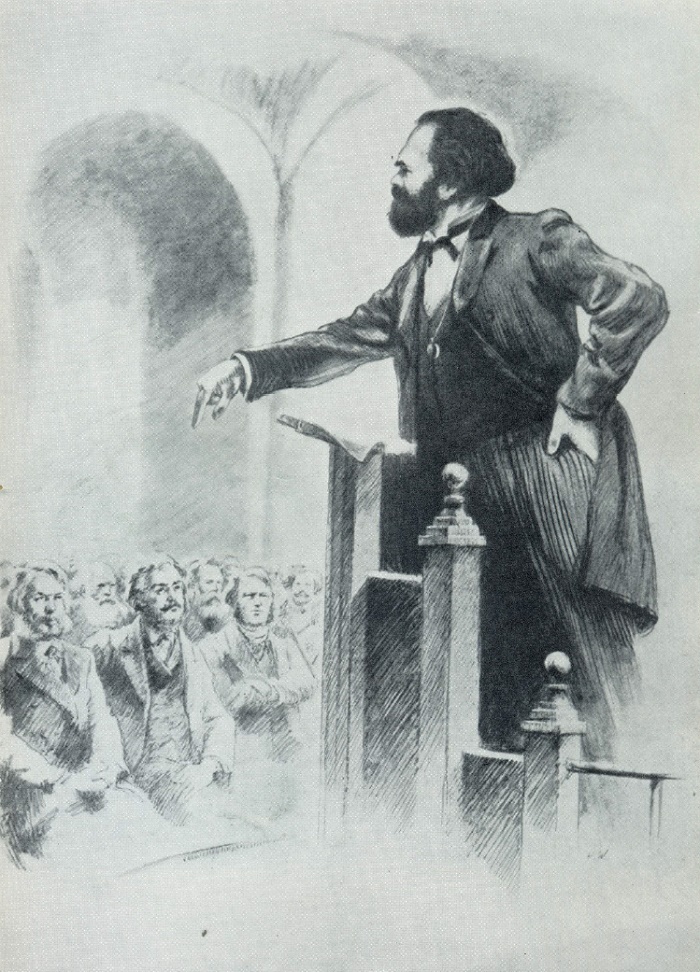
Marx speaks in London (N. Zhukov).
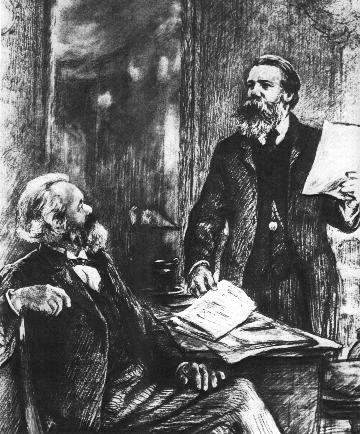
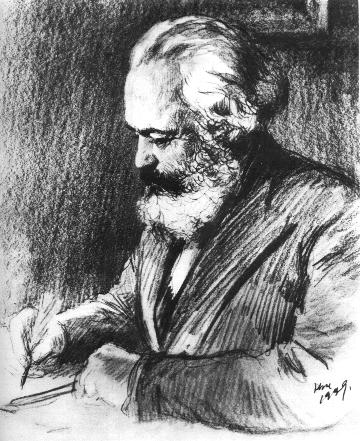
Marx and Engels, circa 1870s (N.
Zhukov).

(V. Lapin)
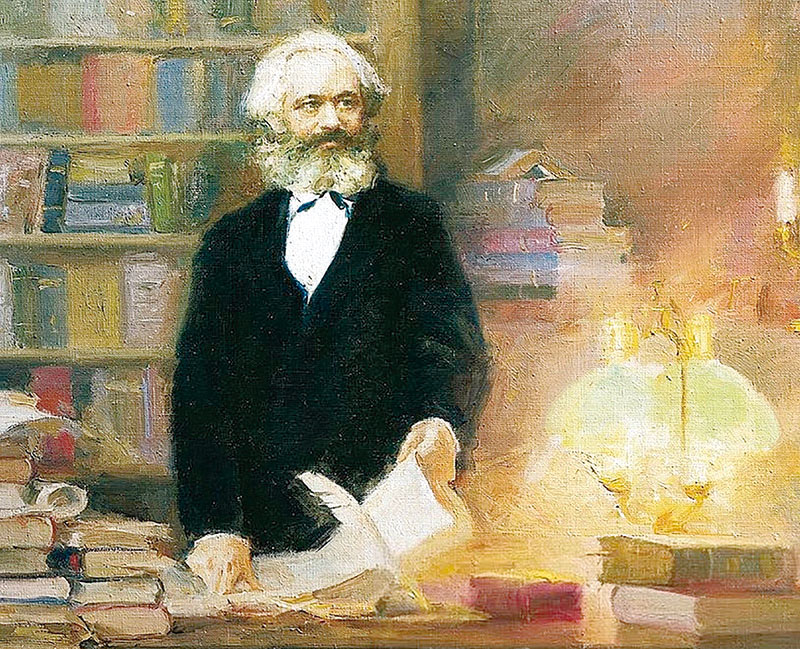
Marx in his studio, 1875 (Detail of
painting by Zhang Wun).
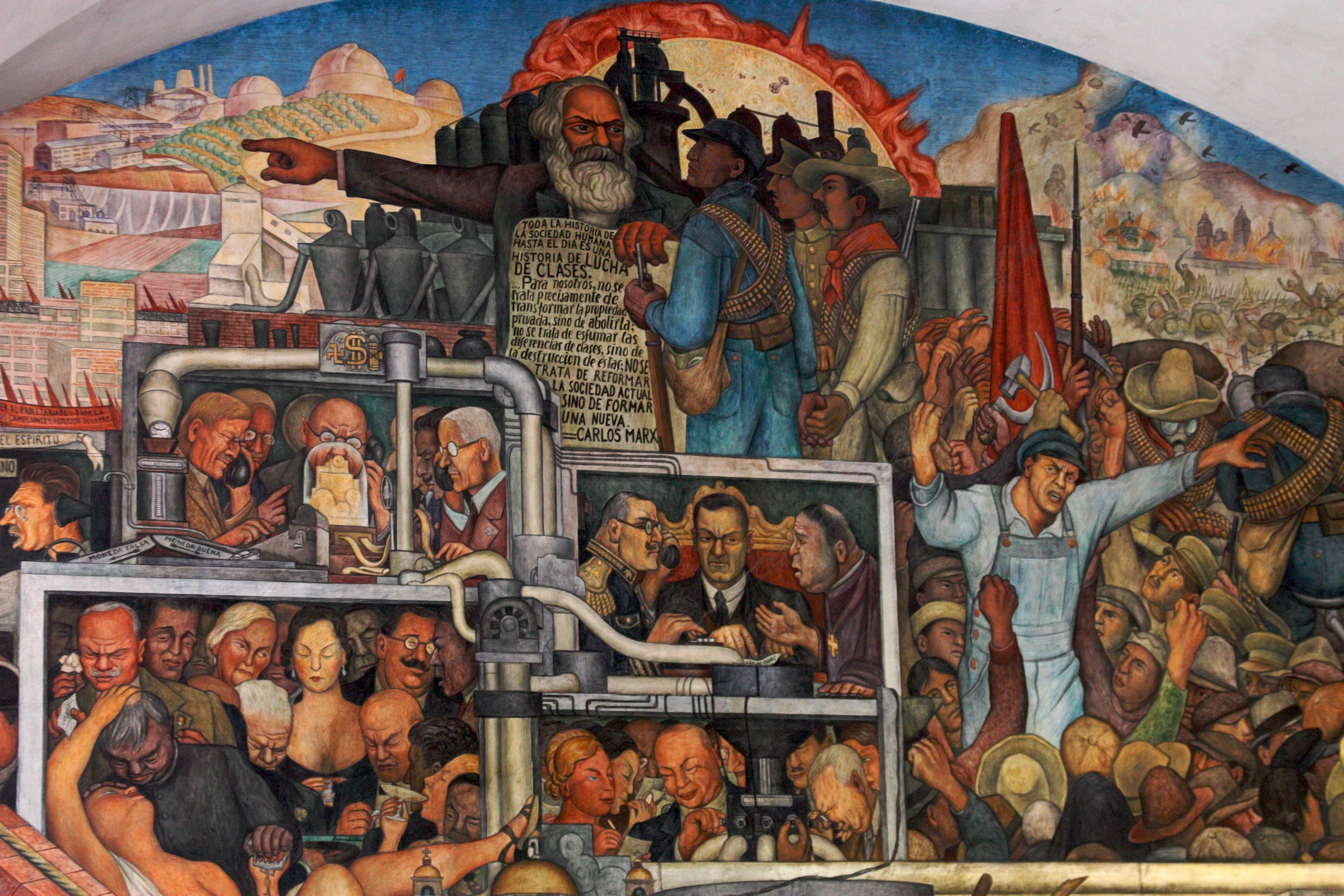
Marx on a mural by Diego Rivera on the Palacio Nacional in Mexico City (jd).
Historical Events During Marx's Life
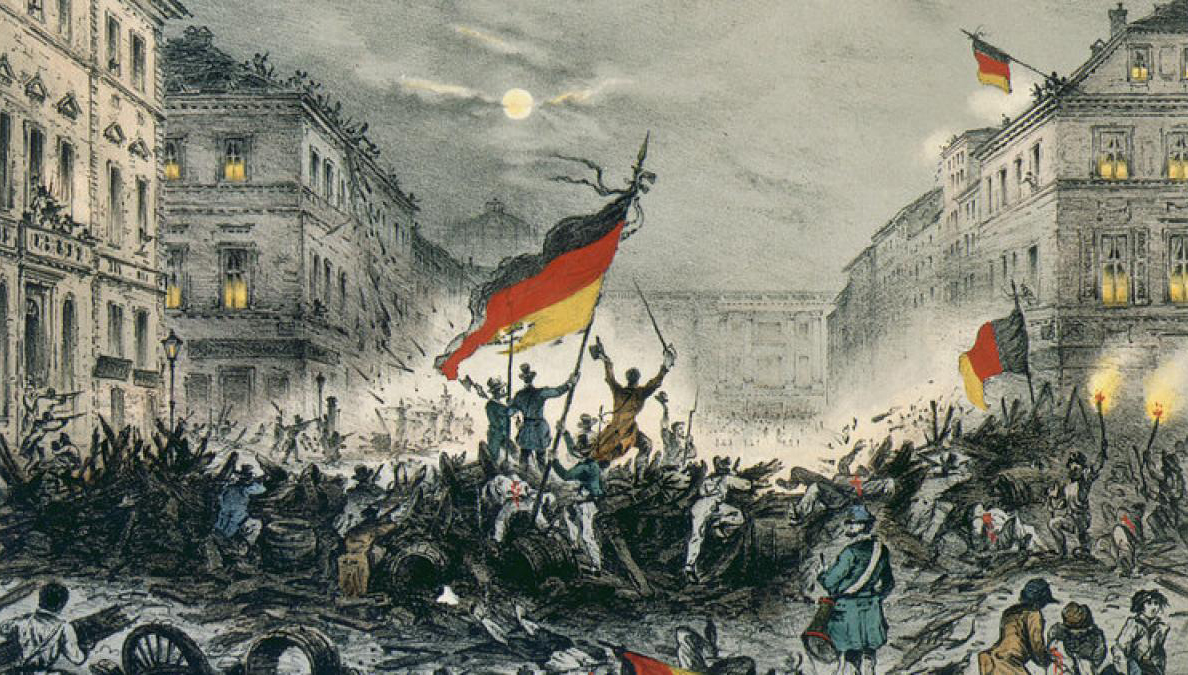
German Revolution, Berlin, March 19, 1848 (artist unknown).
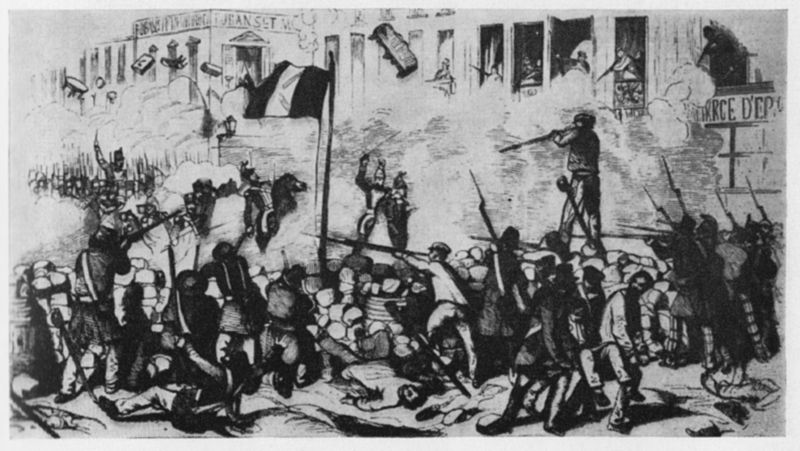
French Revolution, Paris, 1848 (source
unknown).

Barricade on rue de Soufflot
in Paris during the French Revolution,
June 25, 1848 (H. Vernet).
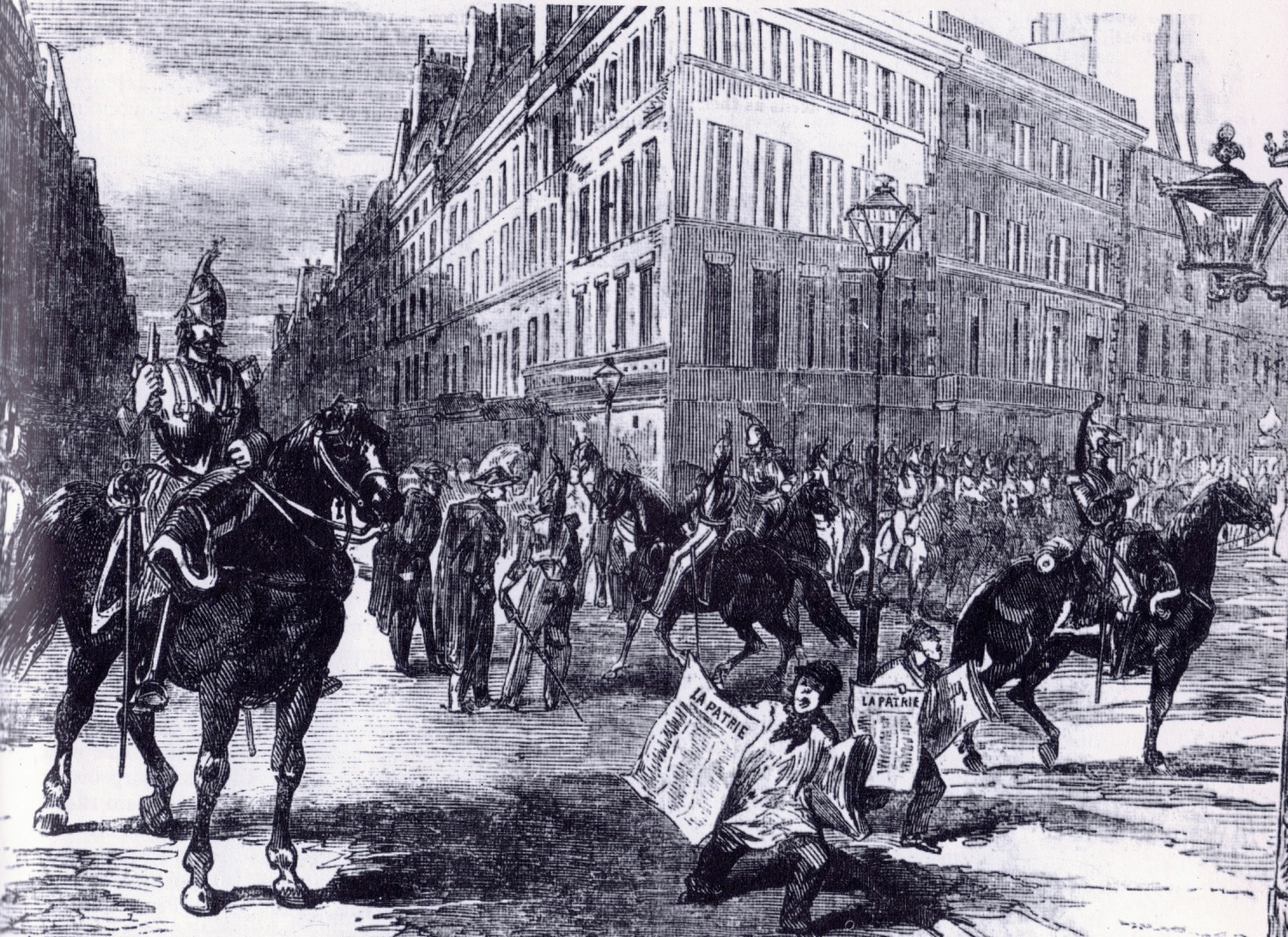
Cavalry patrolling Paris during Napoleon III's coup,
December 2, 1851 (artist unknown).
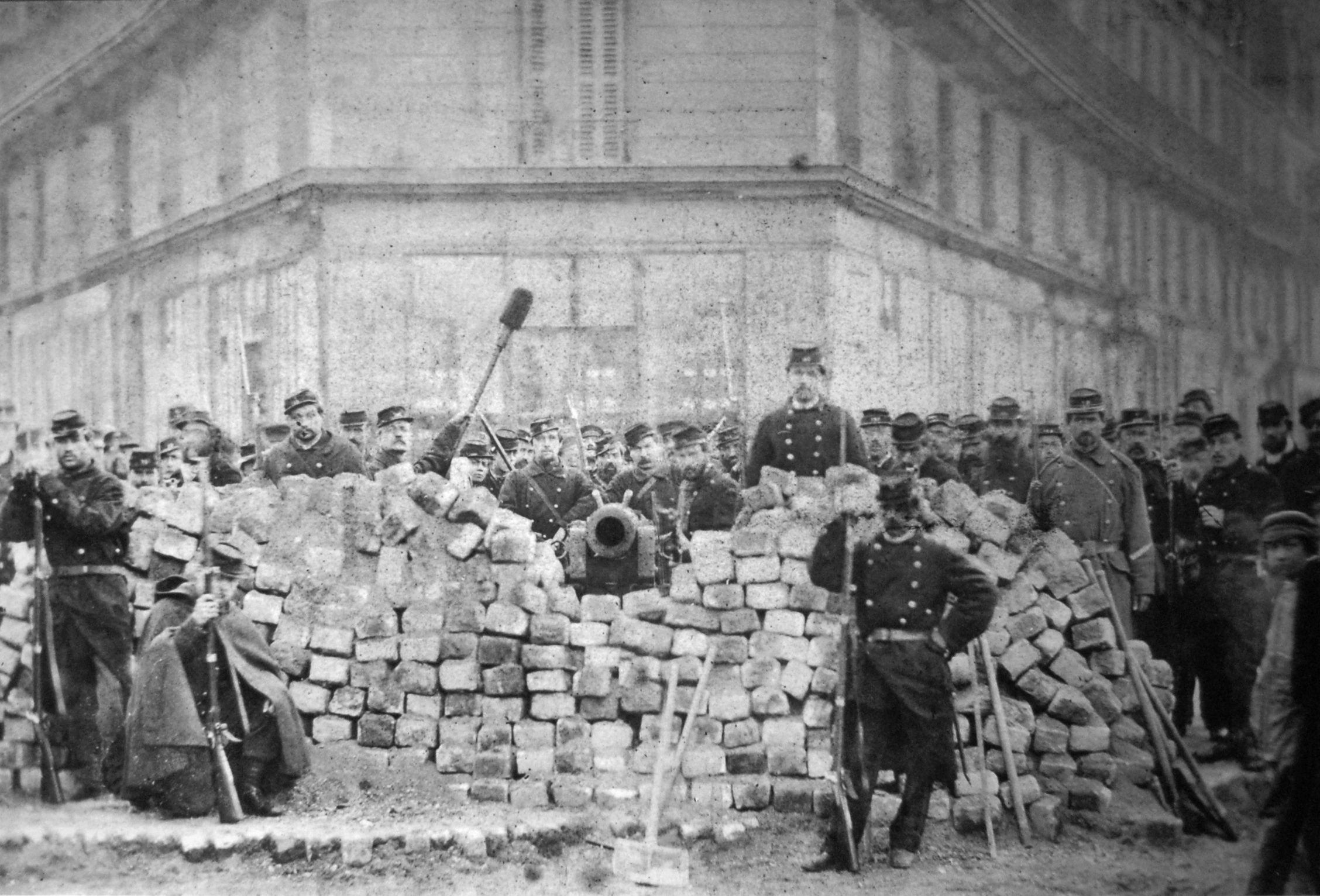
Barricade at intersection of Voltaire and Lenoir during Paris Commune,
1871 (B. Braquehais).

Barricade, Paris, 1871 (P.-A.
Richebourg).
Significant Places
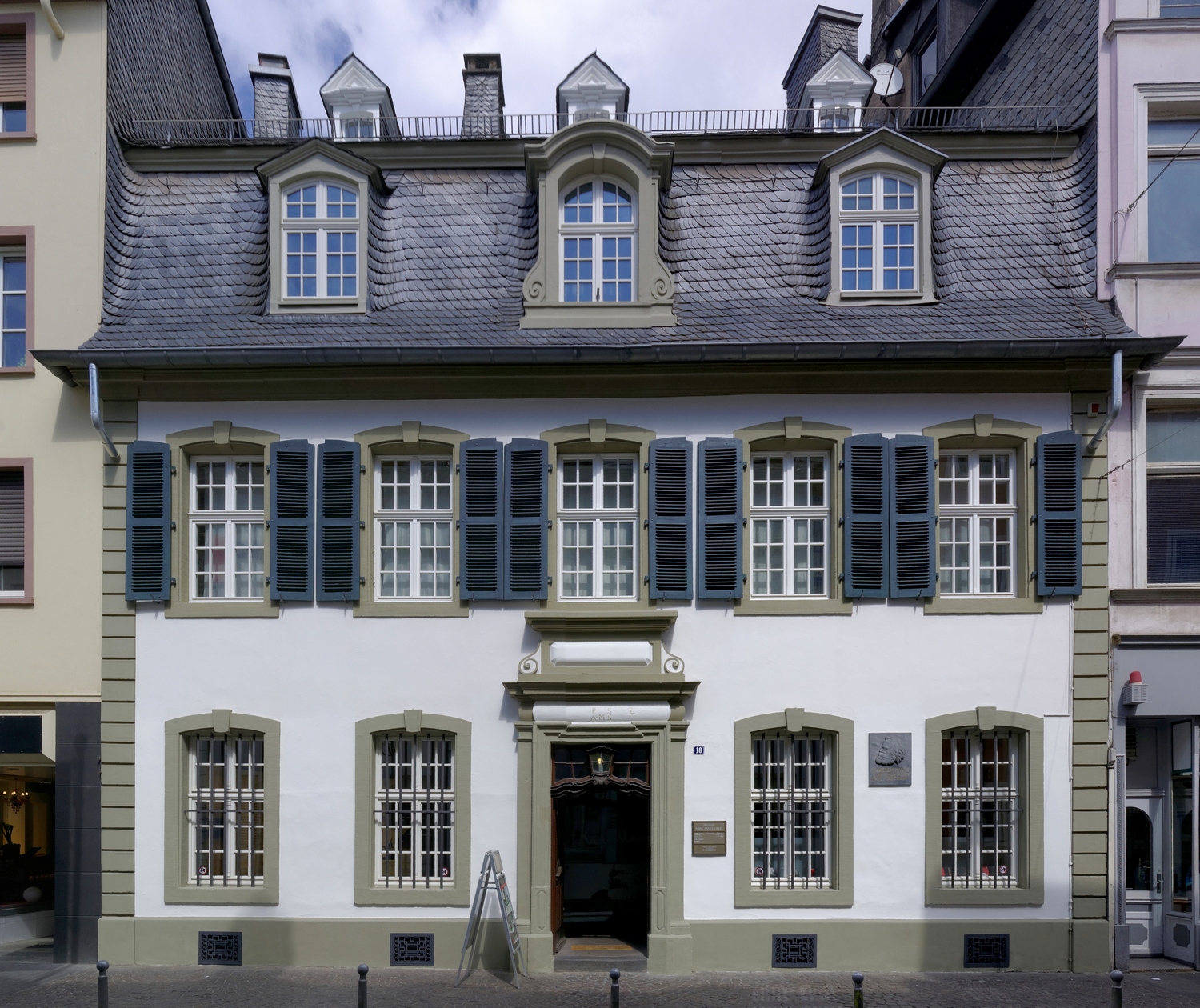
Marx's birthplace in Trier, Germany, which today is a museum (B. Werner).

The house with the red door was the Marx family residence from October
1856 to
March 1864 on Grafton Terrace in London.

Marx's grave in Highgate Cemetery in London (Paasikivi).
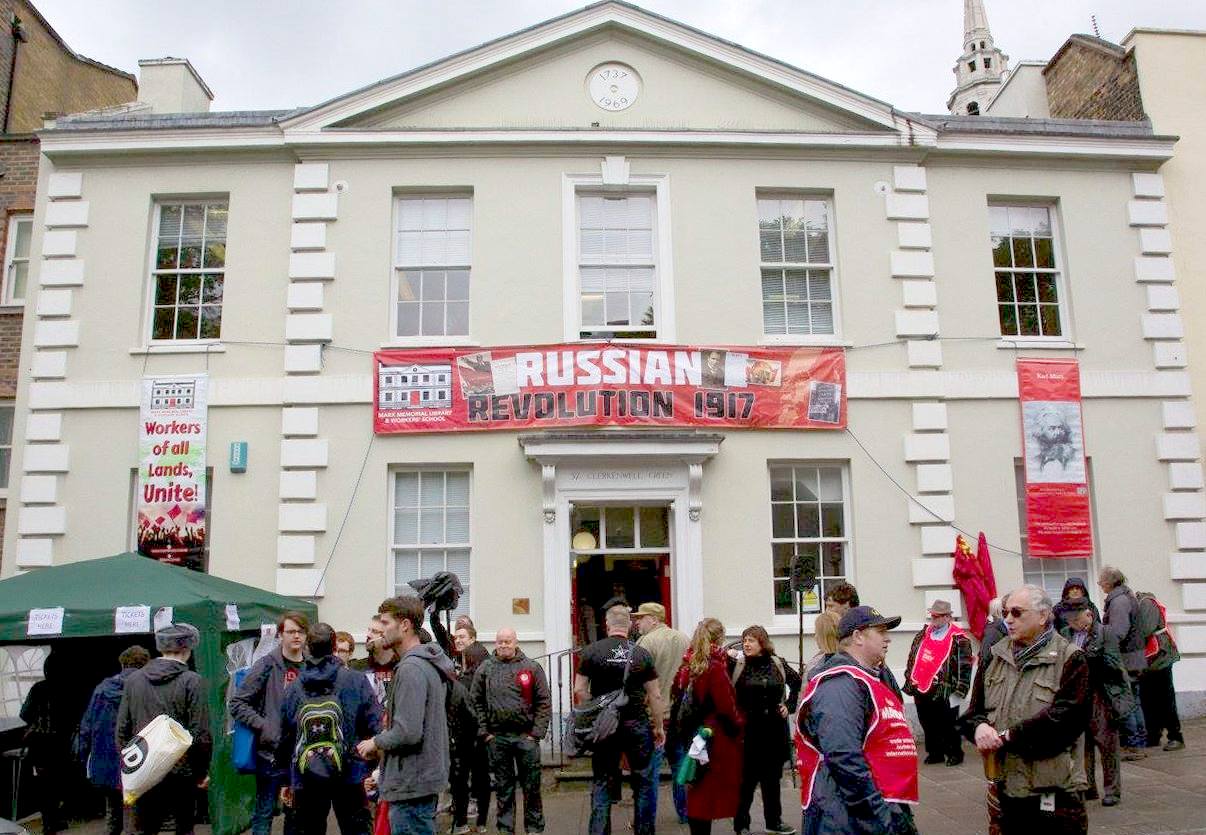
Marx Memorial Library at Clerkenwell Green in London. This historic
building was used by
Marx and later V.I. Lenin, and today features
political events by communists and other progressives. It also houses
an important archive of historical material of the workers' and
communist
movement.

Lenin's office, preserved at the Marx Memorial Library, where he worked
on Iskra (The Spark) during his exile in
London.
Some Published Works
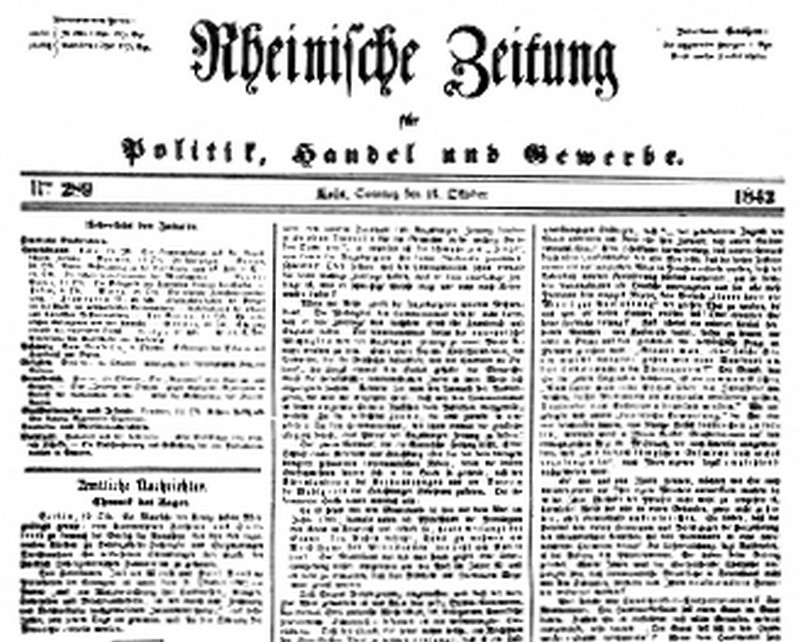
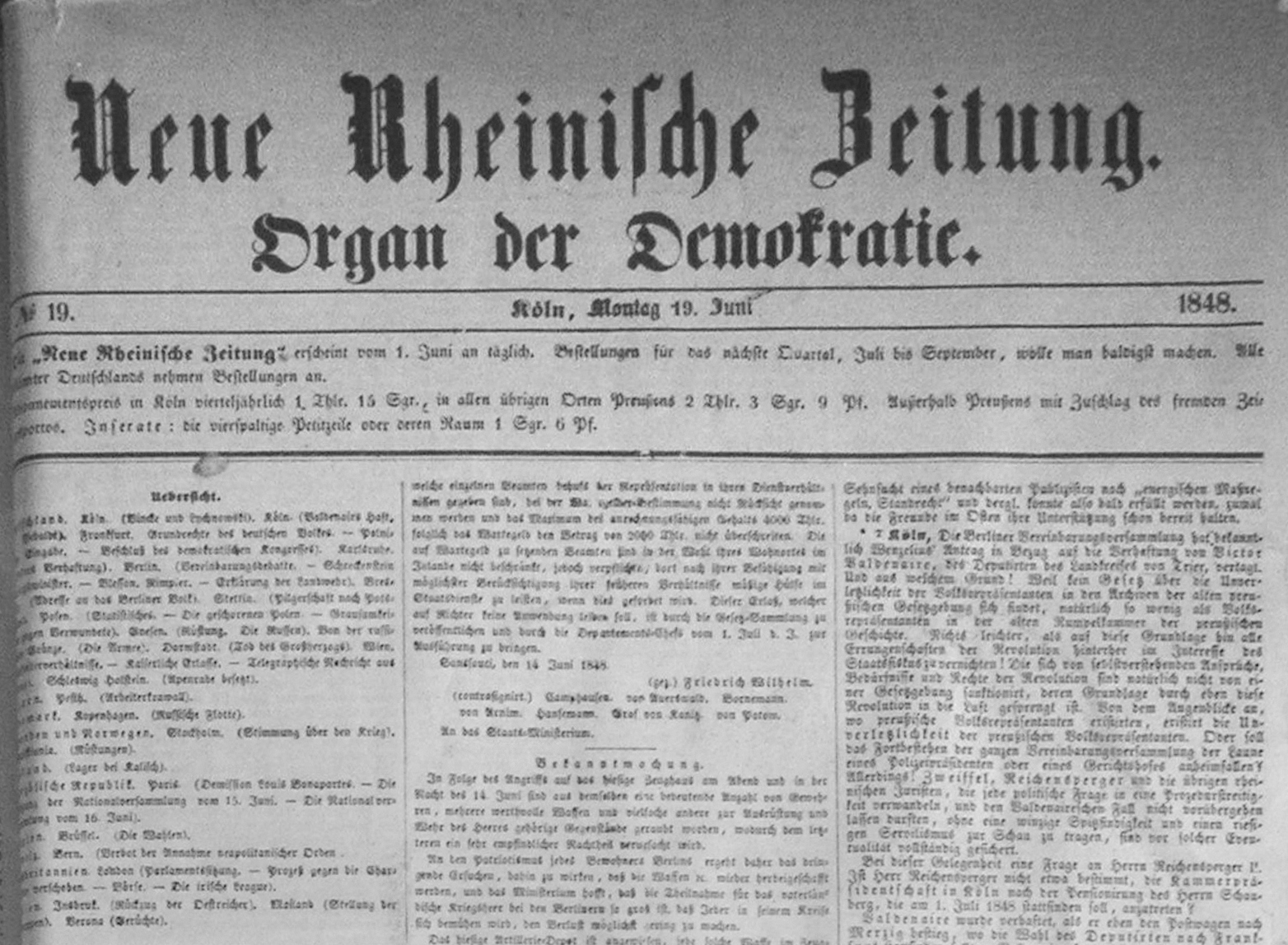
The newspapers Rheinische Zeitung
and Neue Rheinische Zeitung,
both edited by Marx.
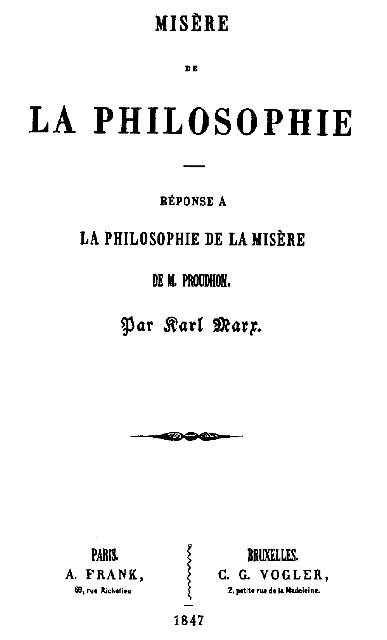
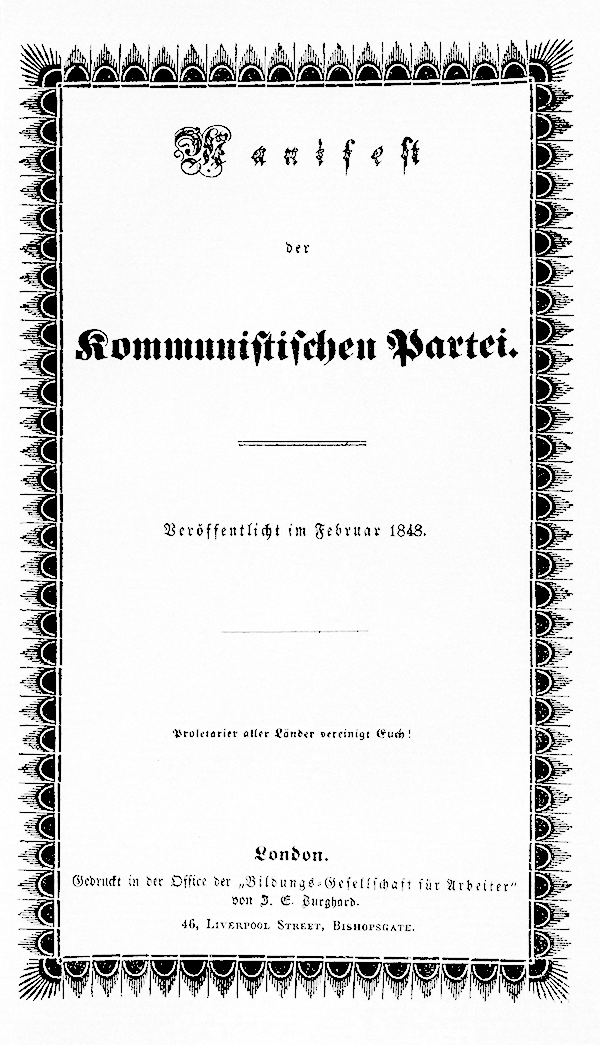
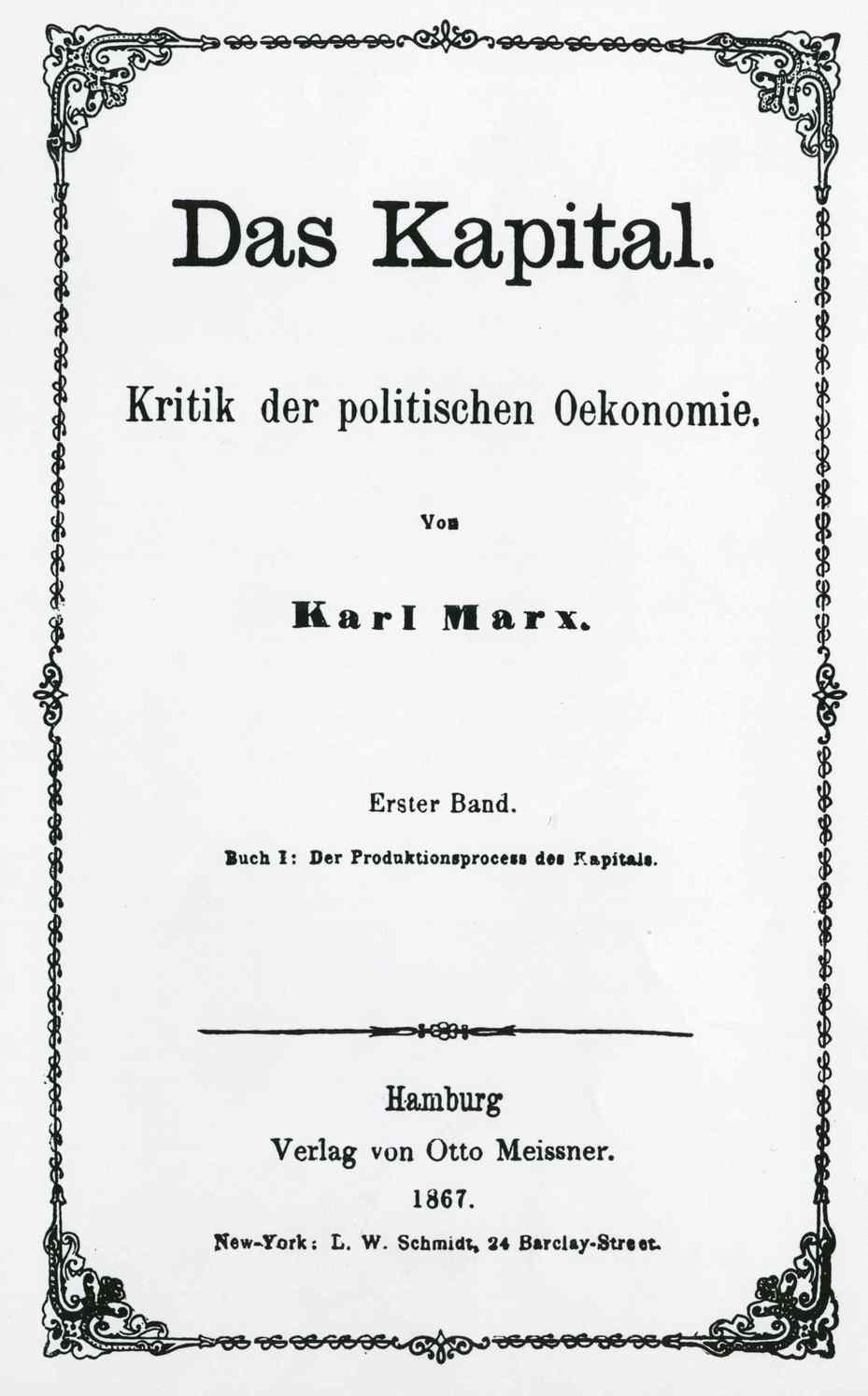
The Poverty of Philosophy,
1847;
Manifesto of the
Communist
Party, 1848;
The Eighteenth Brumaire of Louis
Bonaparte, 1857; Capital,
1867.
Monuments Around the World

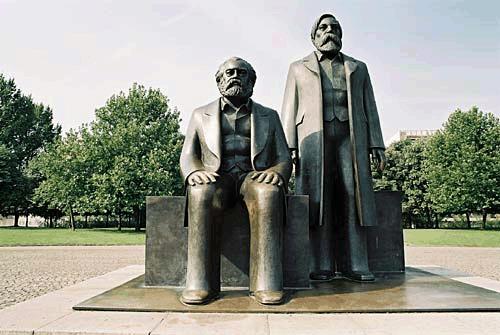
Berlin,
Germany.

Moscow, Russia
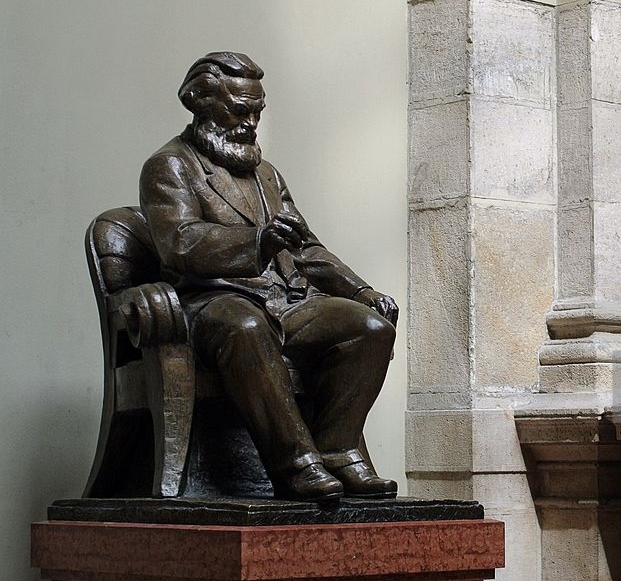
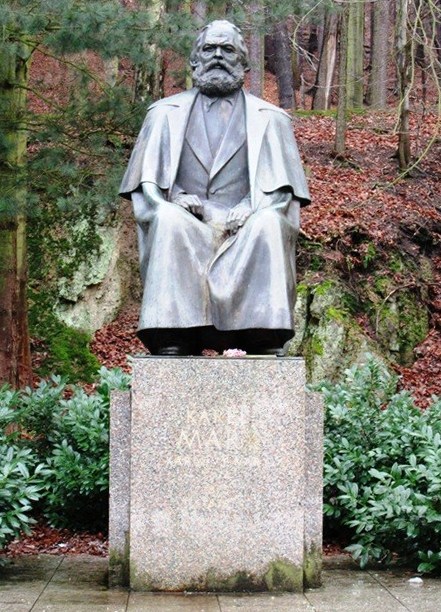
Czech Republic at Corvinus University (left) and Karlovy Vary.

Shanghai, China
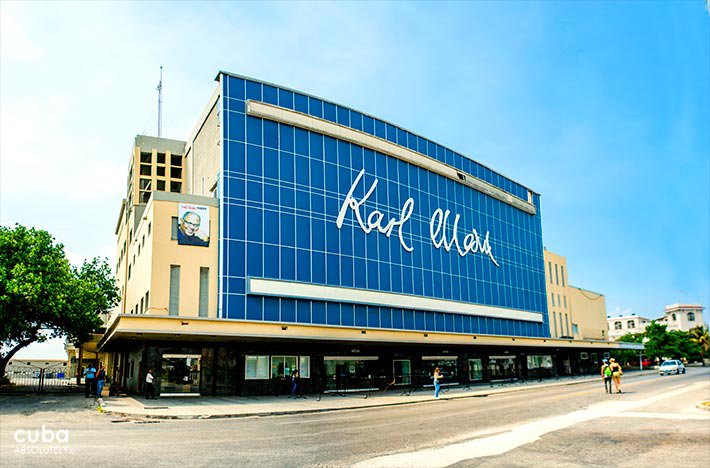
Karl Marx Theatre, Havana, Cuba
Karl Marx's Hometown Unveils Statue by Chinese Artist
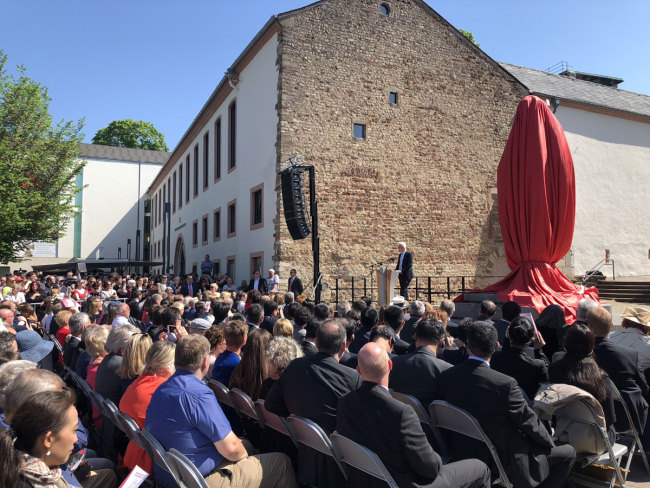
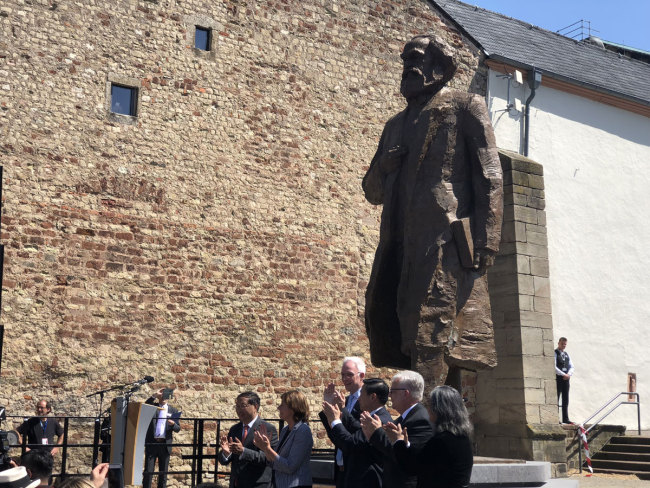
A statue of Karl Marx is officially unveiled on May 5, 2018 in
Karl
Marx's hometown of Trier to celebrate the 200th anniversary of his
birth. The 2.3-ton bronze statue is 5.5-metres tall. It was created by
Chinese artist Wu Weishan, and given to the city as a gift from China.
Video: Marx Memorial Library and Workers' School in London, England
|
|
Website: www.cpcml.ca Email: editor@cpcml.ca

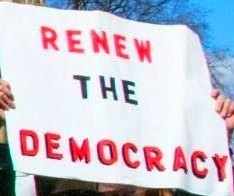

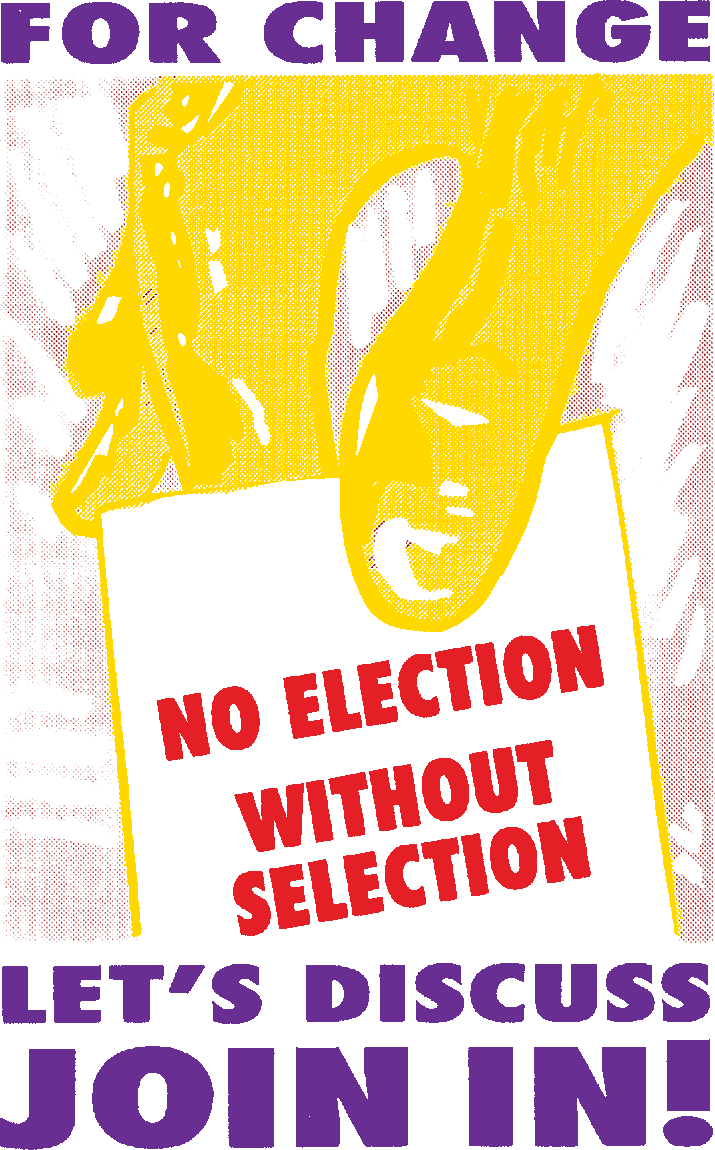 Much of the legislation is
based on recommendations in the
Chief Electoral Officer's report following the 2015 general election,
entitled "An Electoral Framework for the 21st Century." The
recommendations that were accepted by the Committee on Procedure
and House Affairs (PROC), which is mandated to review the report,
relate primarily to making it easier for electors to cast their
ballots; eliminating loopholes and confusion in the law related
to financial regulation; eliminating obstacles to Elections
Canada staffing its offices and the polls; and streamlining or
reducing the regulatory burden on candidates and political
parties. For instance, candidates who do not reach $10,000 in
either contributions or expenses will no longer have to hire
an accountant to audit their returns.
Much of the legislation is
based on recommendations in the
Chief Electoral Officer's report following the 2015 general election,
entitled "An Electoral Framework for the 21st Century." The
recommendations that were accepted by the Committee on Procedure
and House Affairs (PROC), which is mandated to review the report,
relate primarily to making it easier for electors to cast their
ballots; eliminating loopholes and confusion in the law related
to financial regulation; eliminating obstacles to Elections
Canada staffing its offices and the polls; and streamlining or
reducing the regulatory burden on candidates and political
parties. For instance, candidates who do not reach $10,000 in
either contributions or expenses will no longer have to hire
an accountant to audit their returns.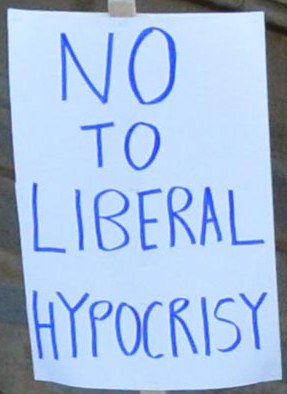 On the day Bill C-76 was
tabled, members of the Privy
Council, where the Ministry of Democratic Institutions is housed,
held a technical briefing with the media, followed by a press
conference with Acting Minister of Democratic Institutions Scott
Brison. One of the questions raised was the last-minute character
of the legislation.[
On the day Bill C-76 was
tabled, members of the Privy
Council, where the Ministry of Democratic Institutions is housed,
held a technical briefing with the media, followed by a press
conference with Acting Minister of Democratic Institutions Scott
Brison. One of the questions raised was the last-minute character
of the legislation.[

 The BC government's
pay-the-rich scheme and embrace of LNG
Canada's project explains in part why it reversed its earlier
opposition, before the NDP became the
governing party, to BC Hydro's massive Site C hydroelectric project on
the Peace River in northern BC. Site C will supply at least some of the
electricity needed for future LNG projects in BC.
The BC government's
pay-the-rich scheme and embrace of LNG
Canada's project explains in part why it reversed its earlier
opposition, before the NDP became the
governing party, to BC Hydro's massive Site C hydroelectric project on
the Peace River in northern BC. Site C will supply at least some of the
electricity needed for future LNG projects in BC.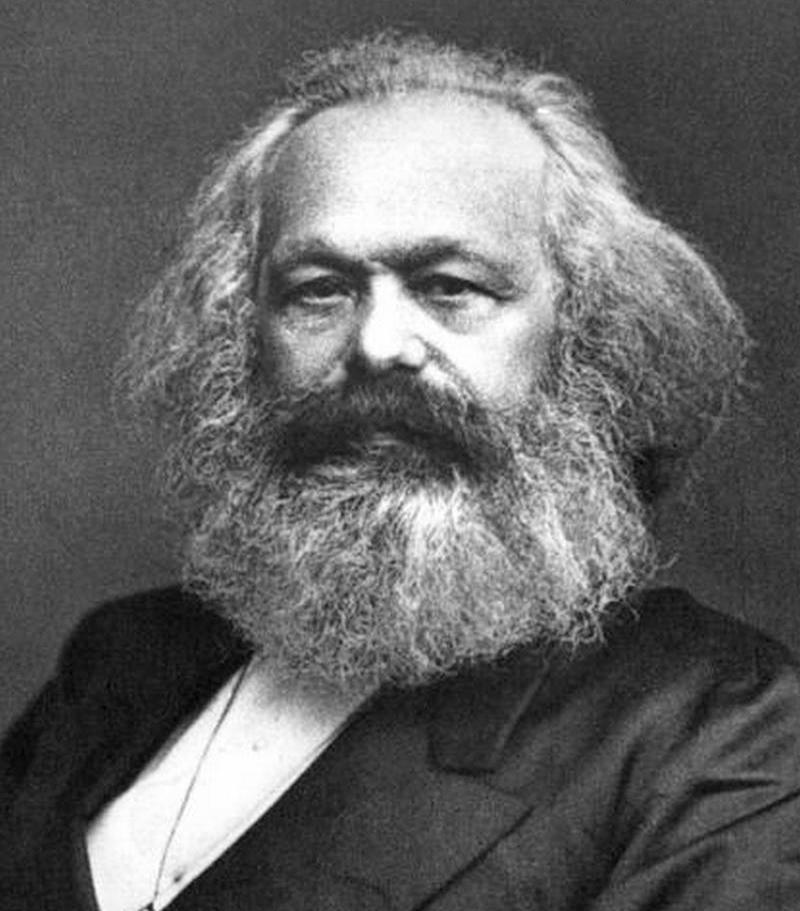
 Humankind will always look towards the life and work of
this
man of genius, teacher and leader of the proletariat, with great
revolutionary admiration and gratitude. Our Party remains loyal
to the ideas of Karl Marx which, through their constant
development and enrichment, have become the treasury of
Marxism-Leninism, the unerring theoretical base of the
revolutionary practice of any communist party worthy of the
name.
Humankind will always look towards the life and work of
this
man of genius, teacher and leader of the proletariat, with great
revolutionary admiration and gratitude. Our Party remains loyal
to the ideas of Karl Marx which, through their constant
development and enrichment, have become the treasury of
Marxism-Leninism, the unerring theoretical base of the
revolutionary practice of any communist party worthy of the
name.